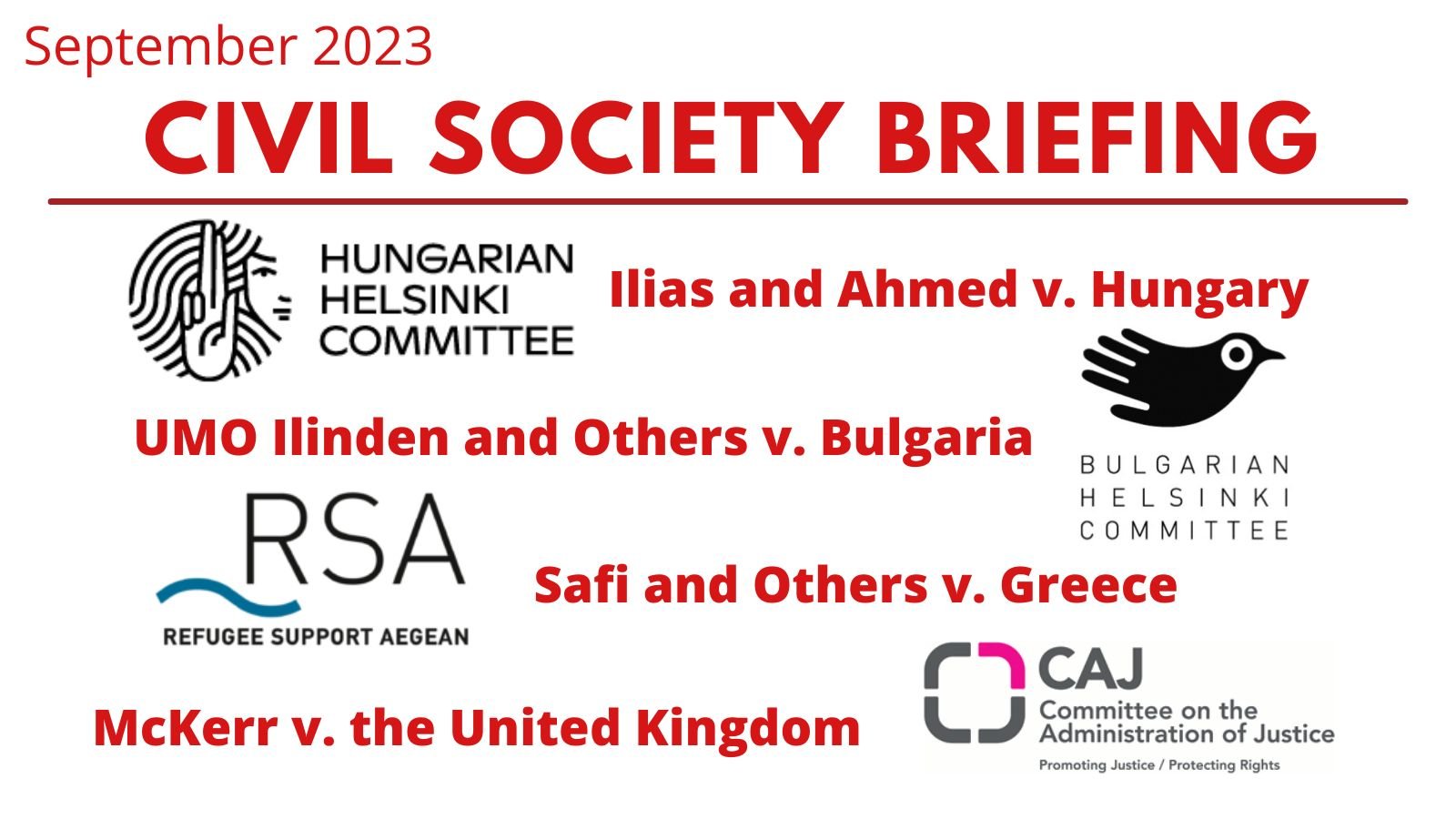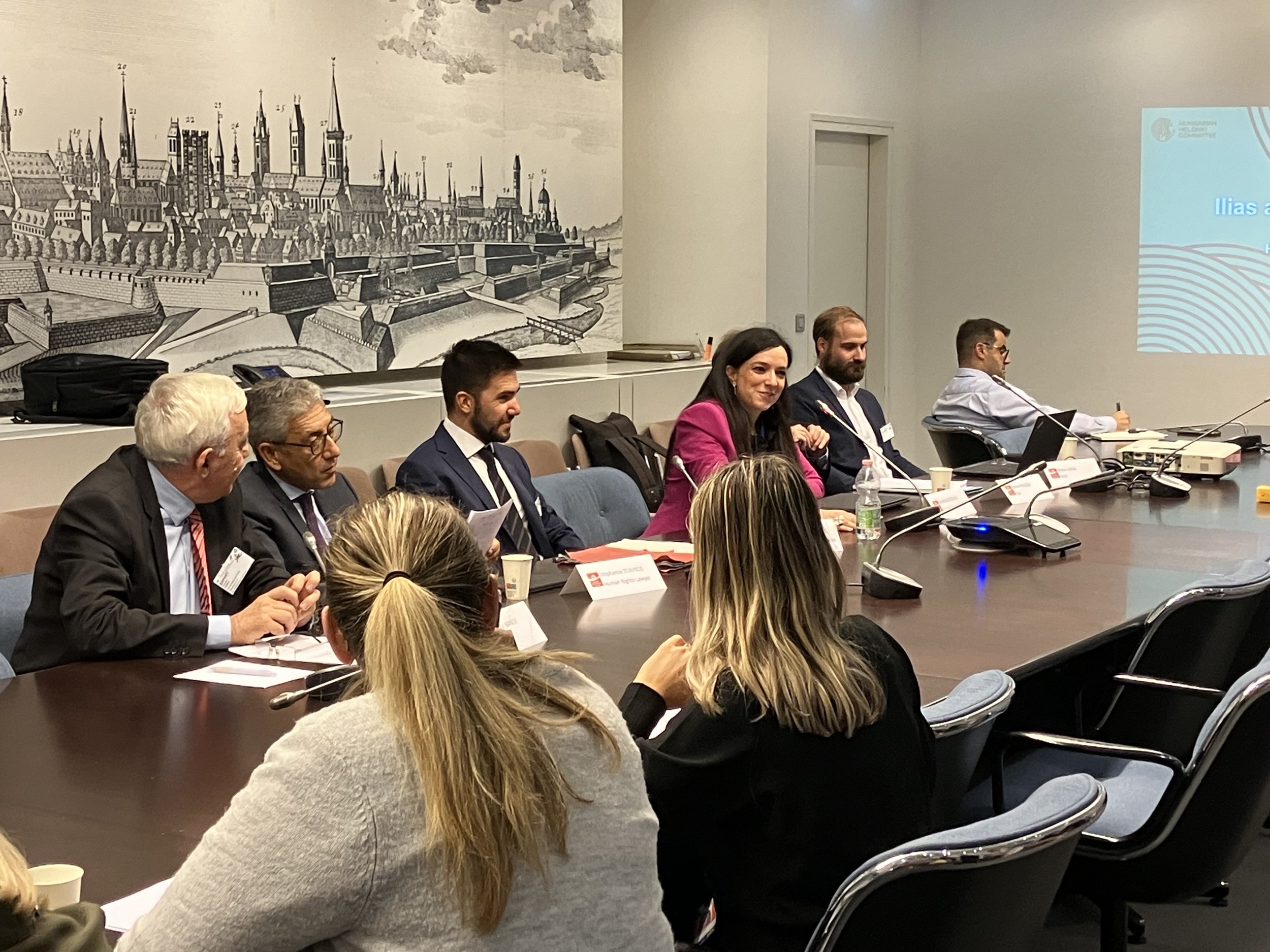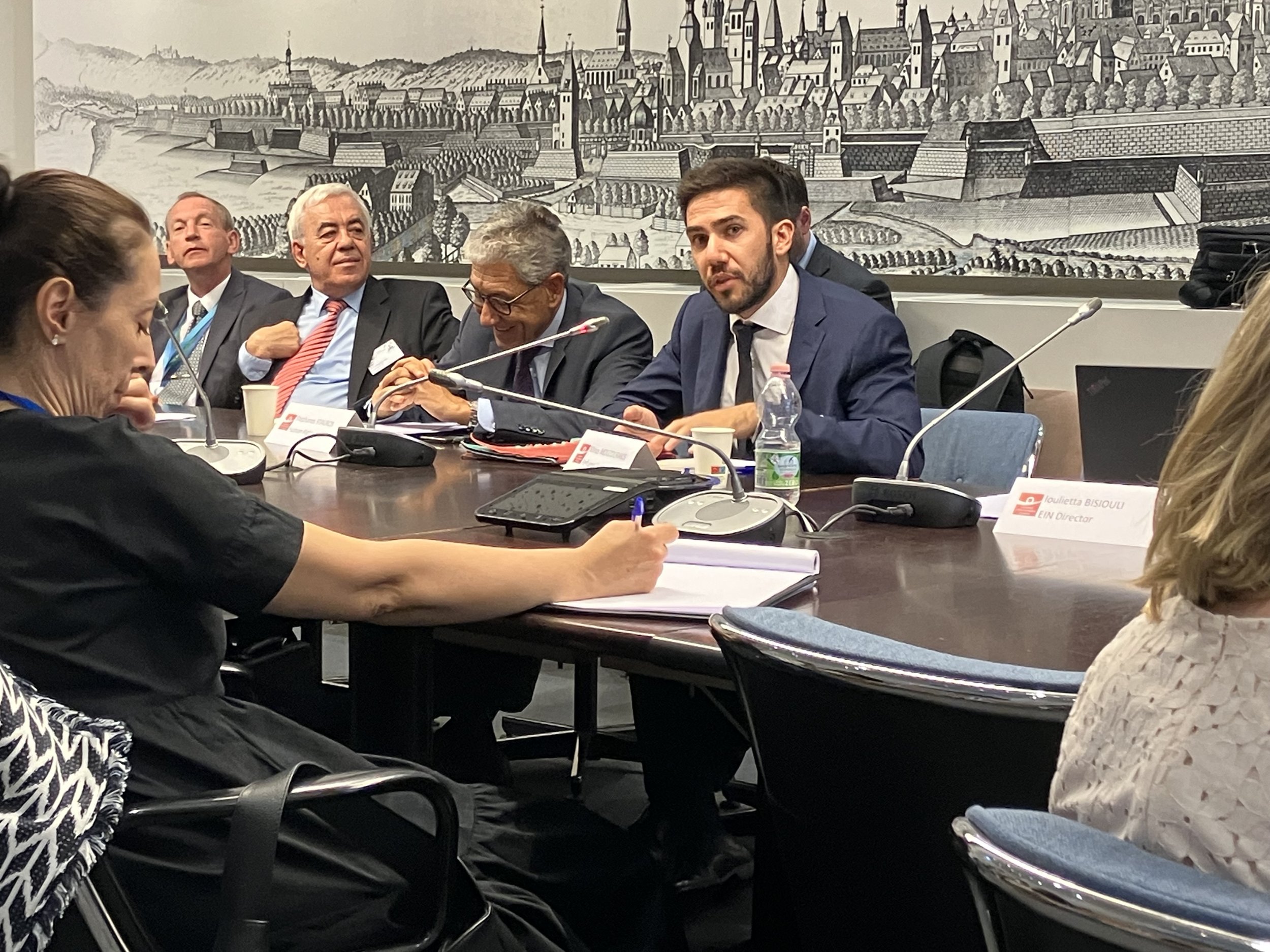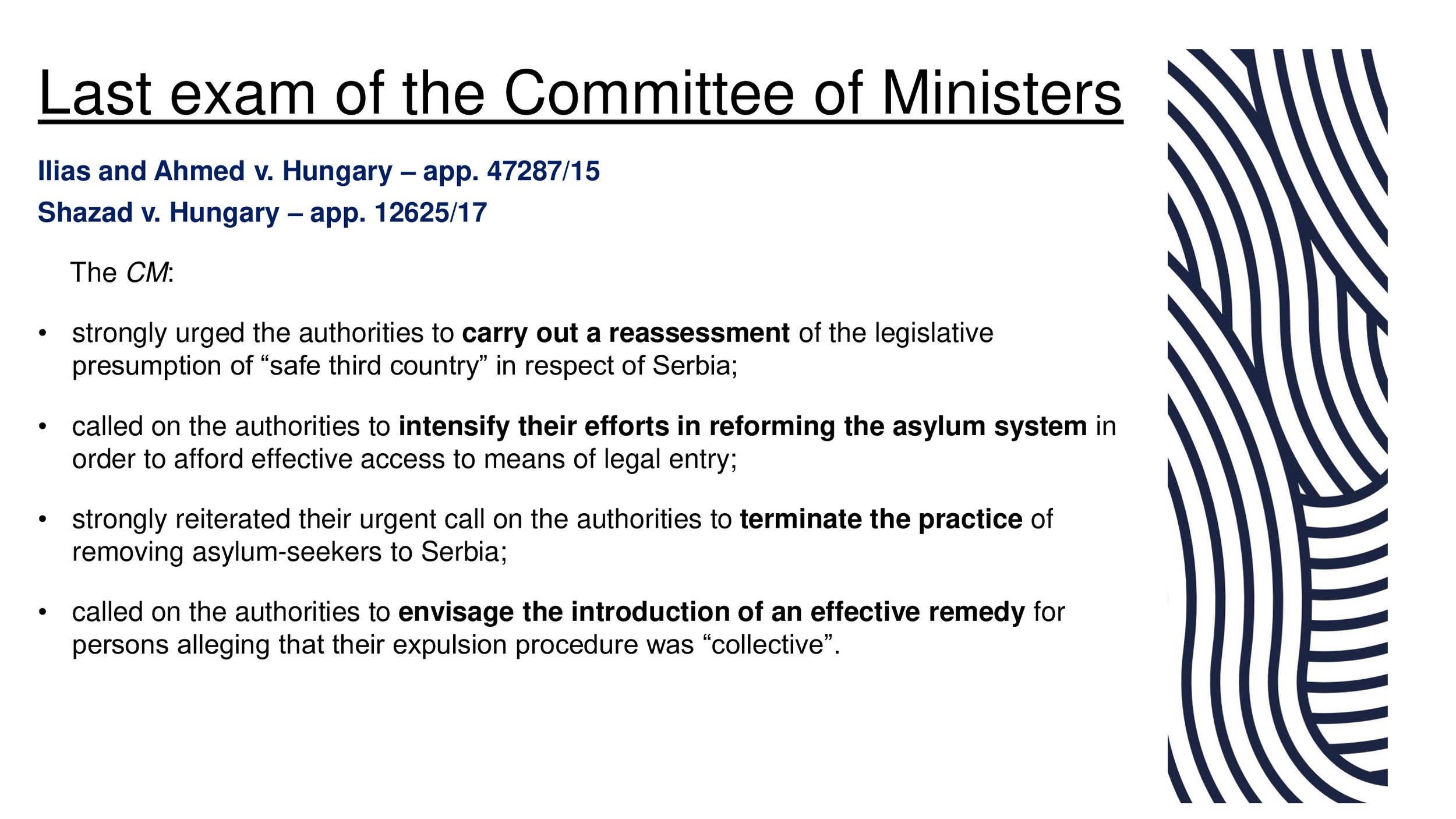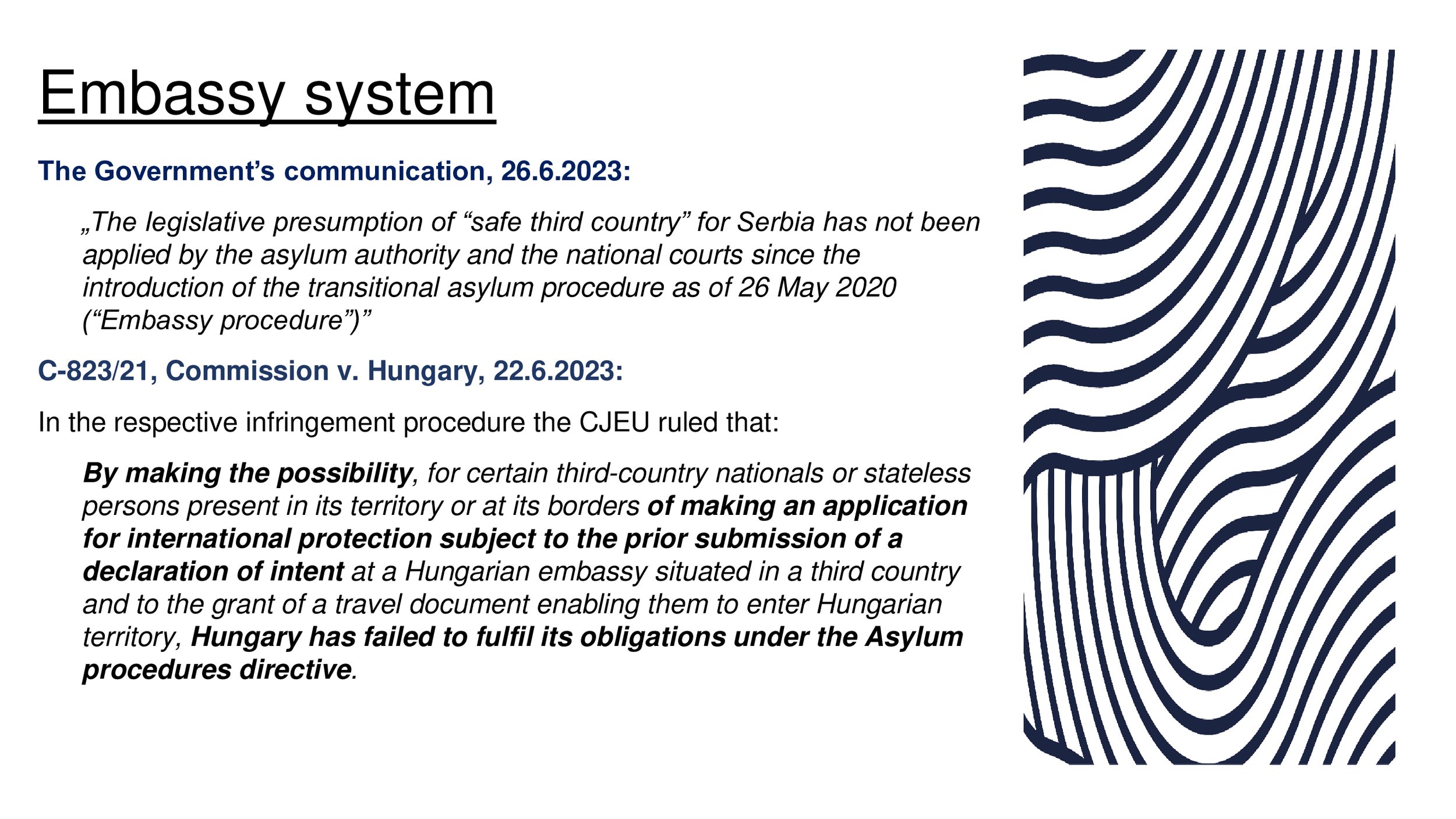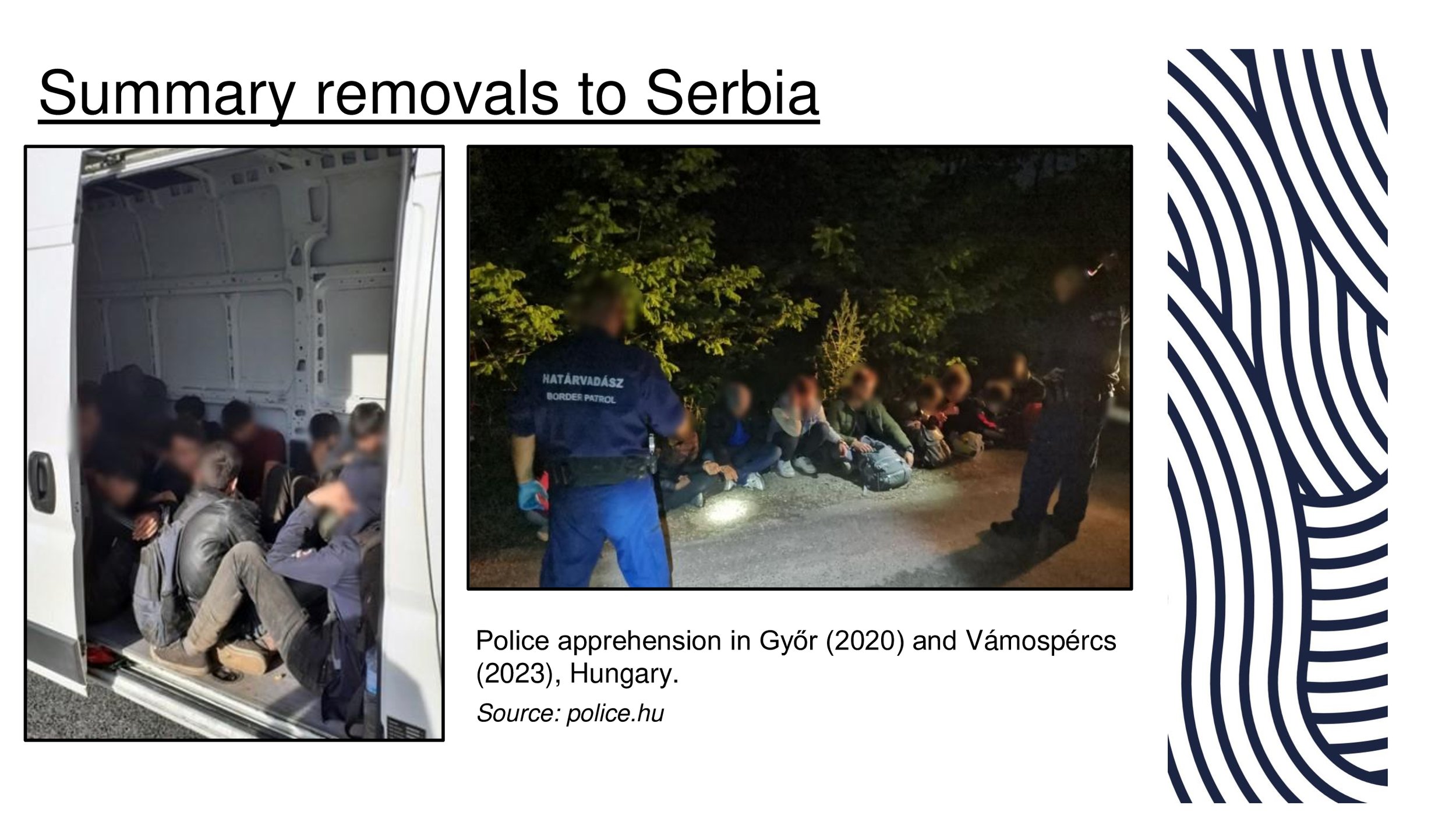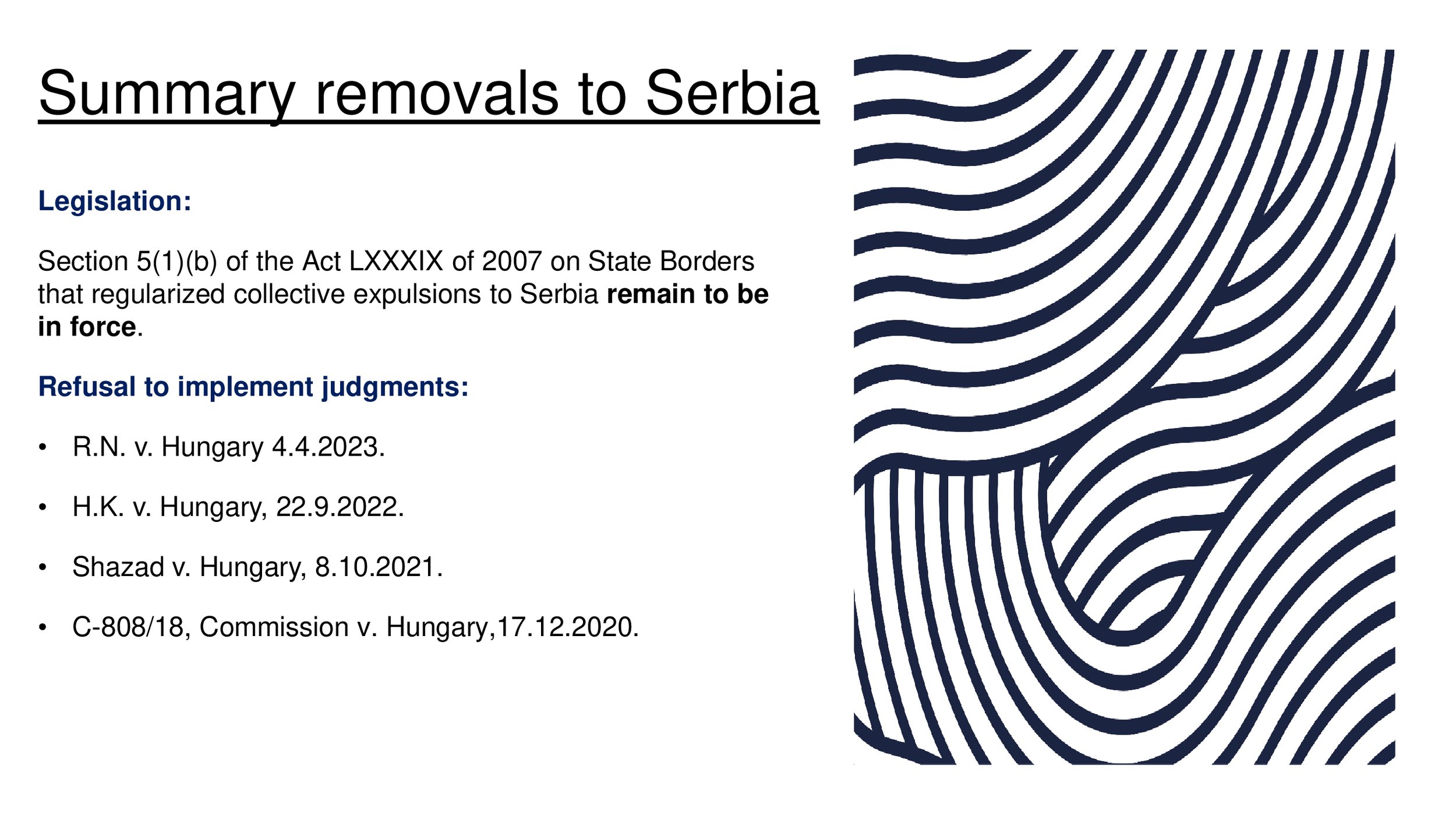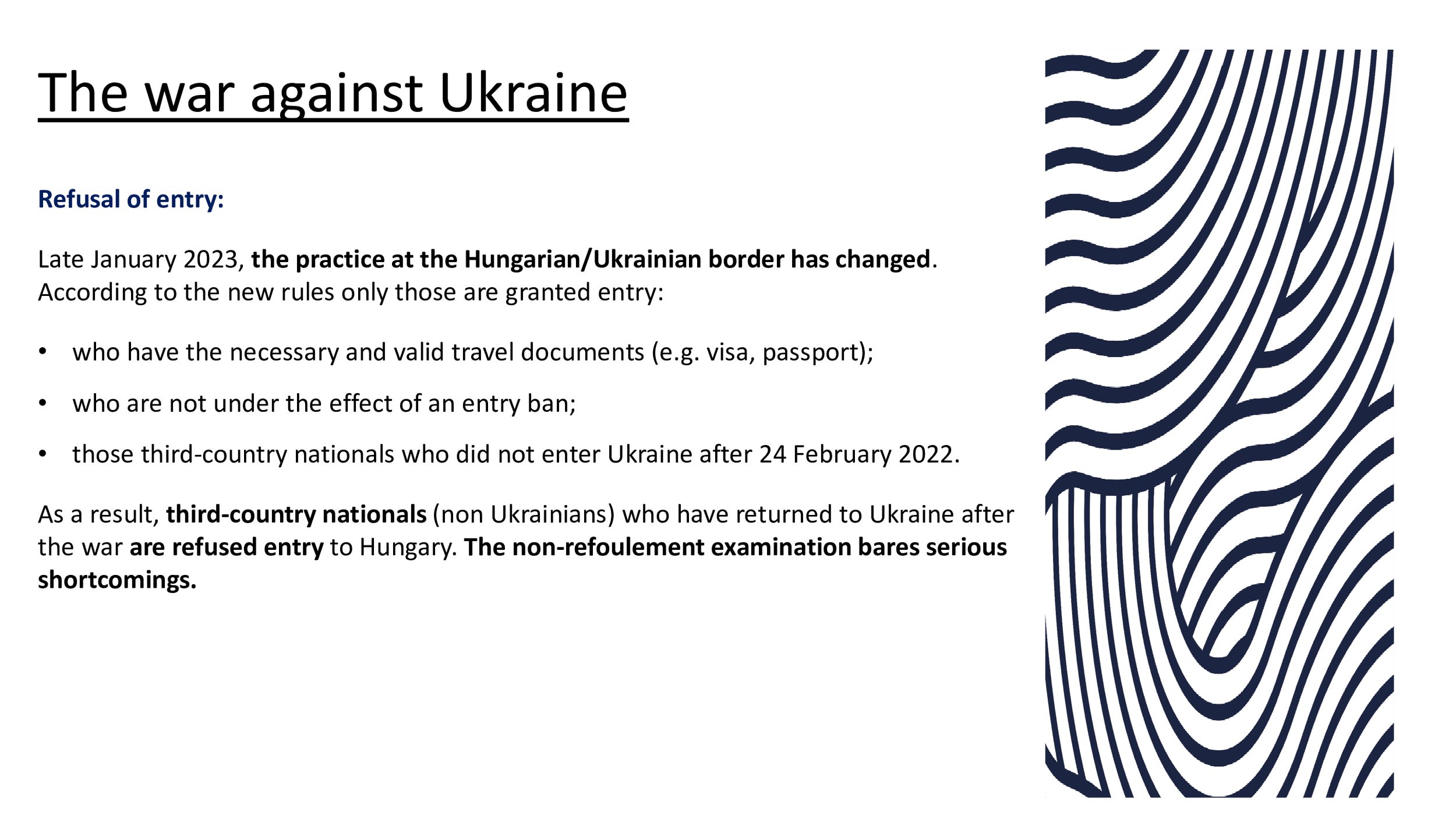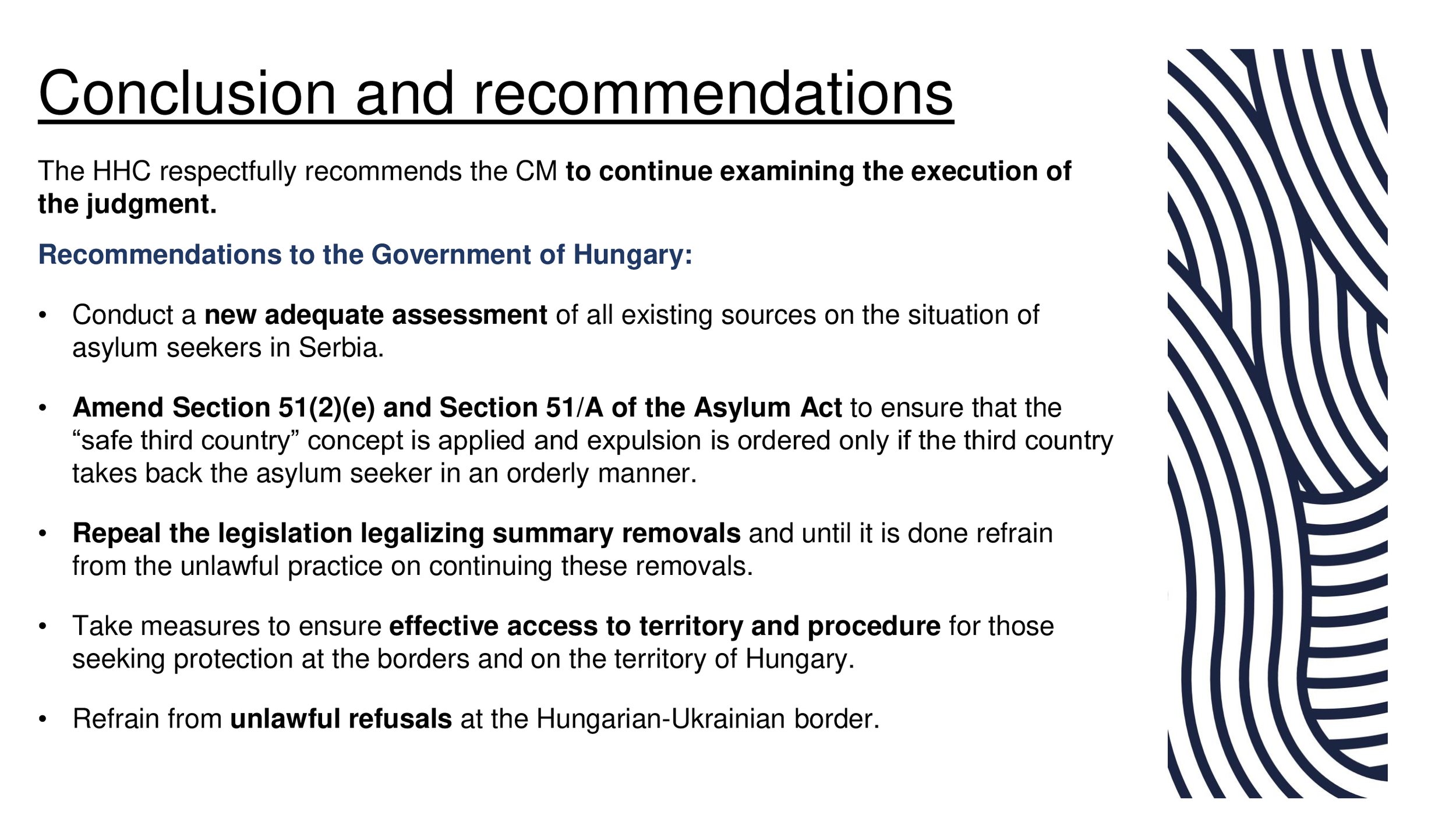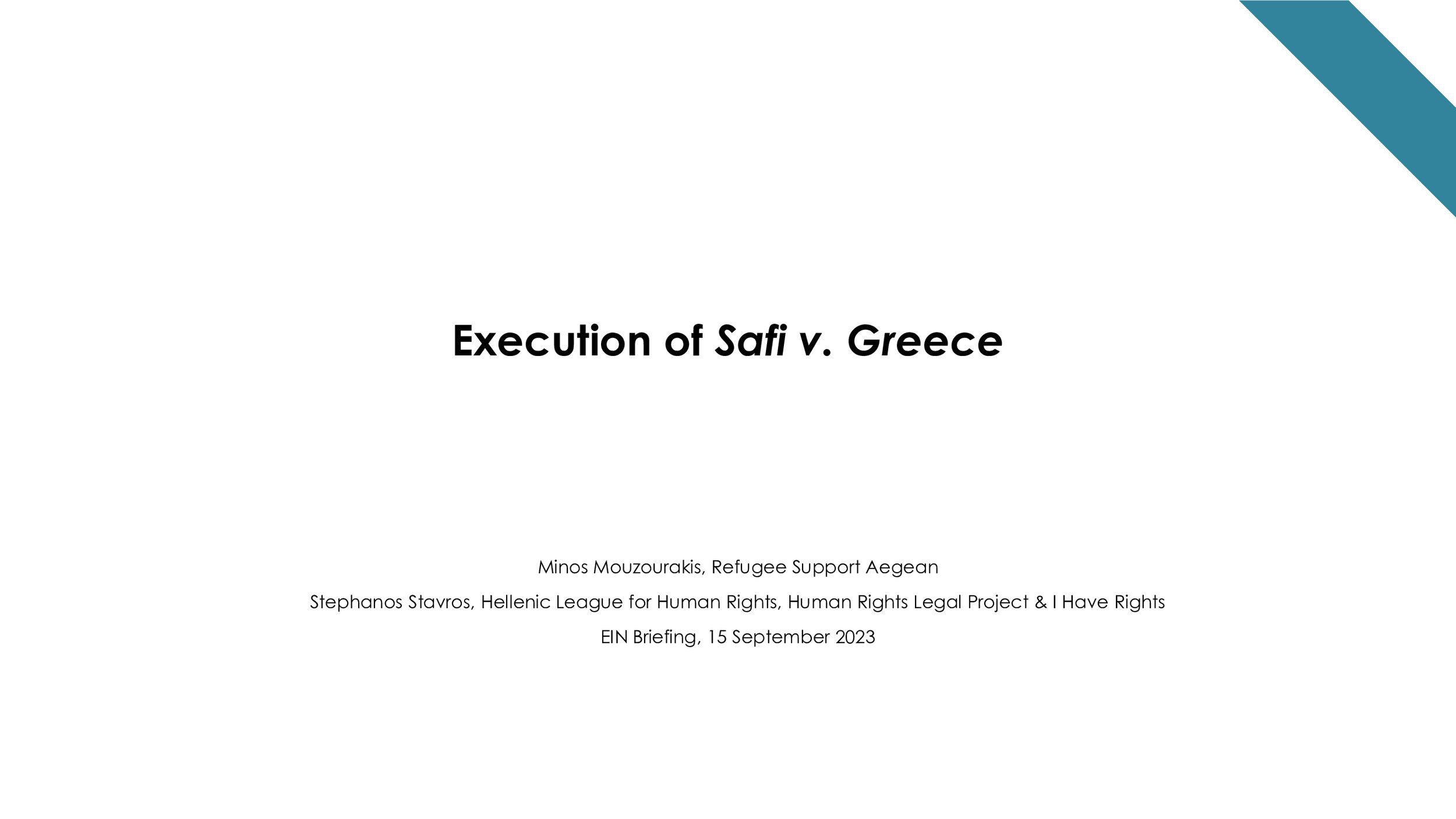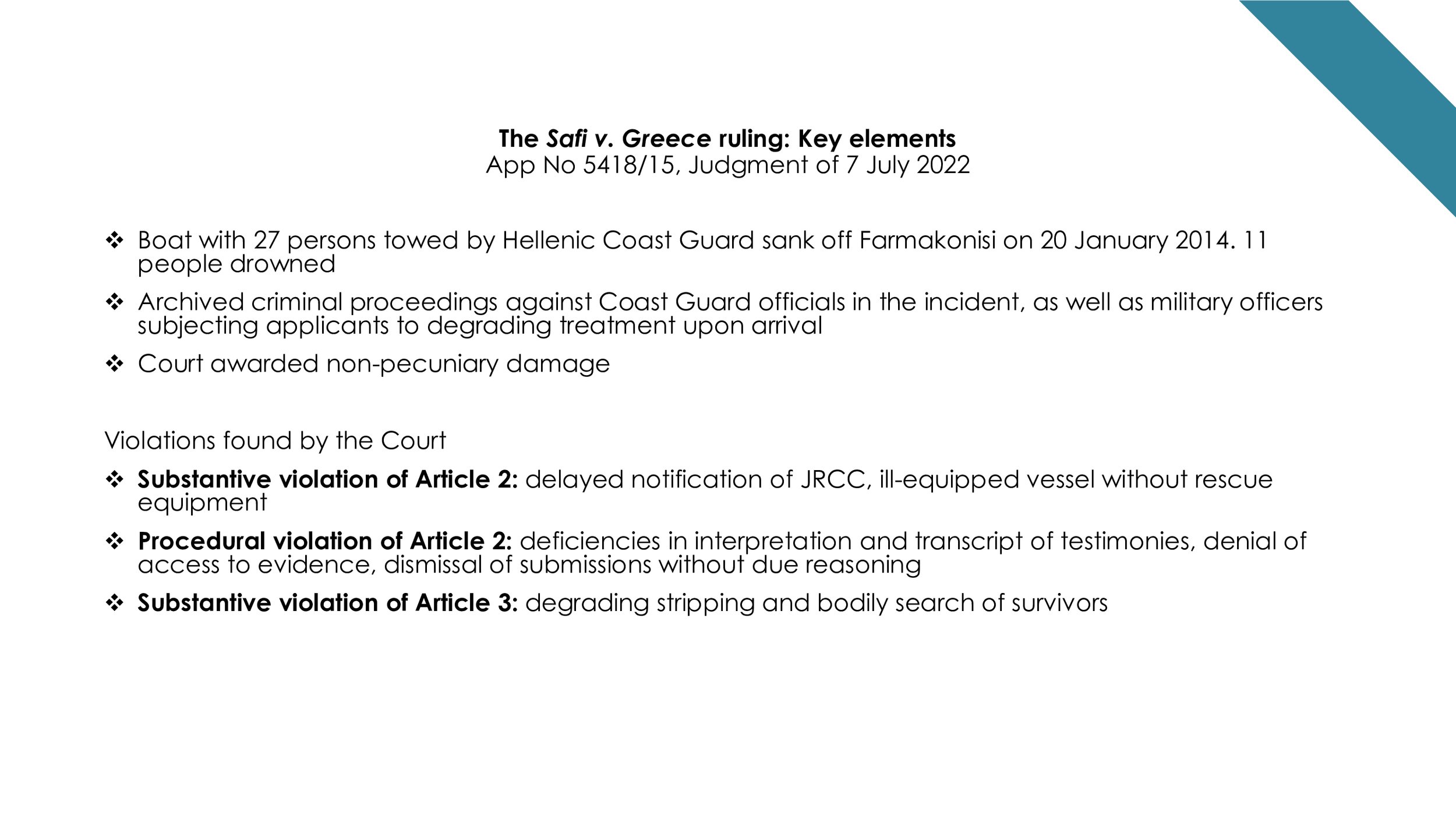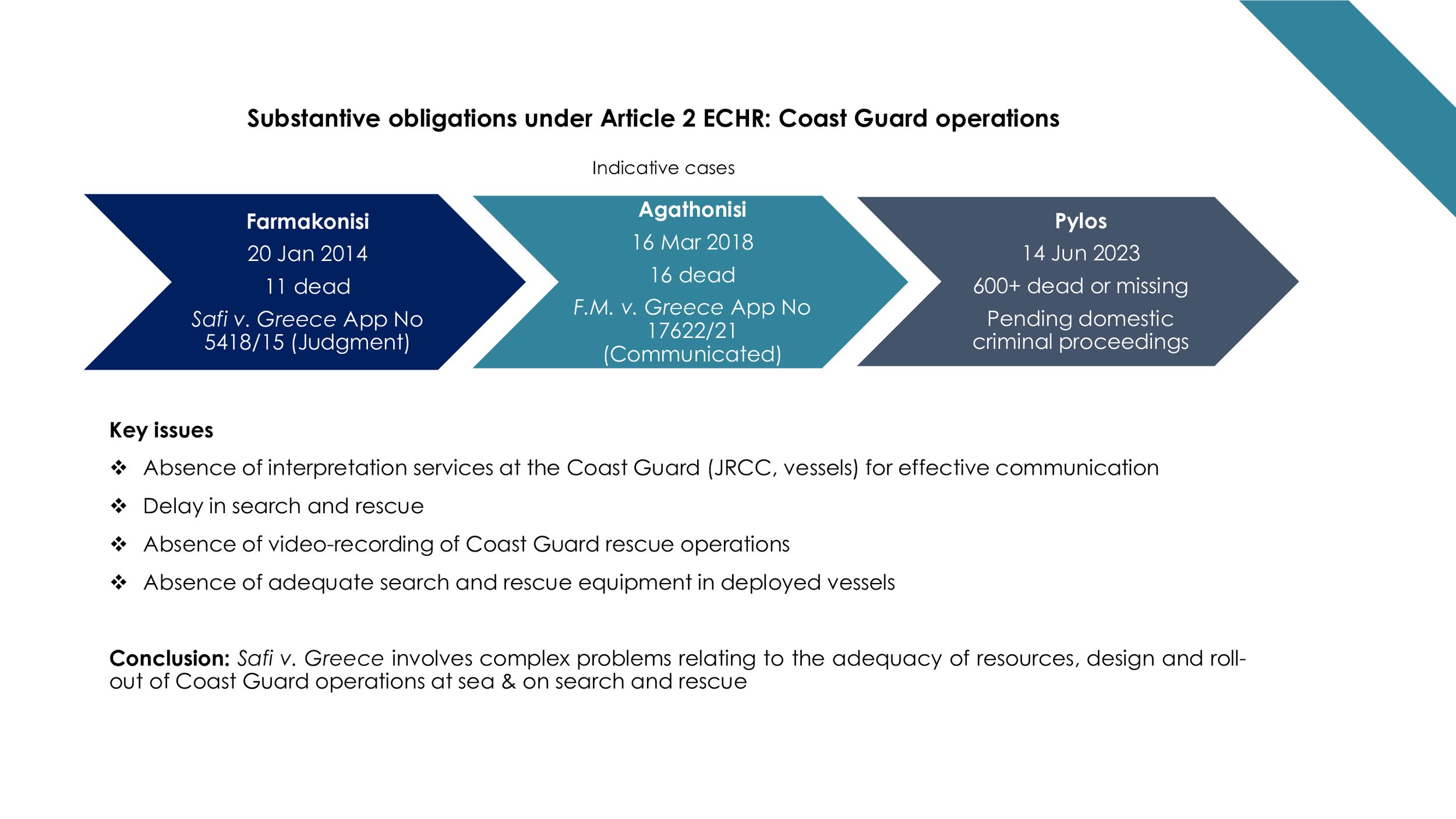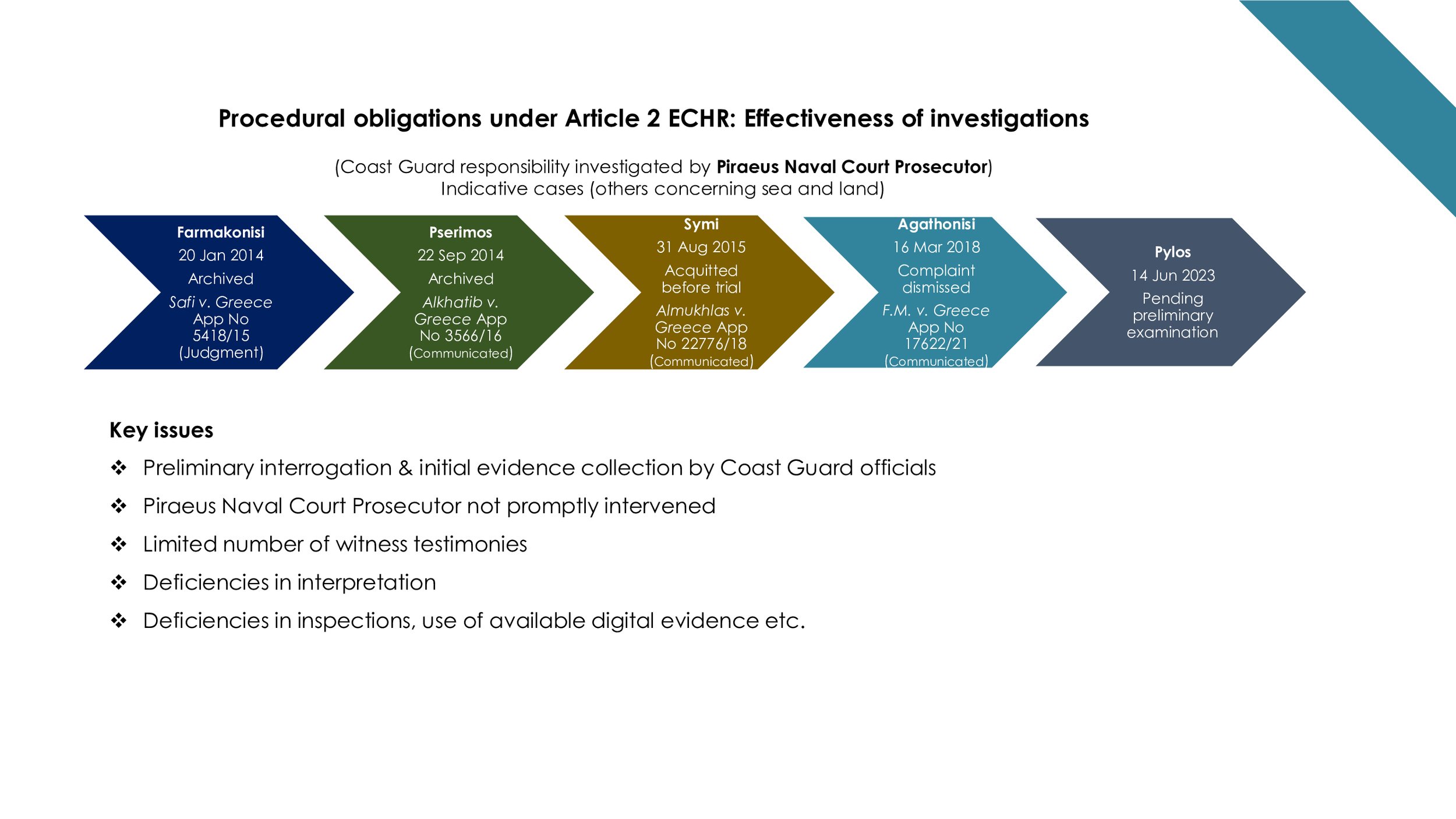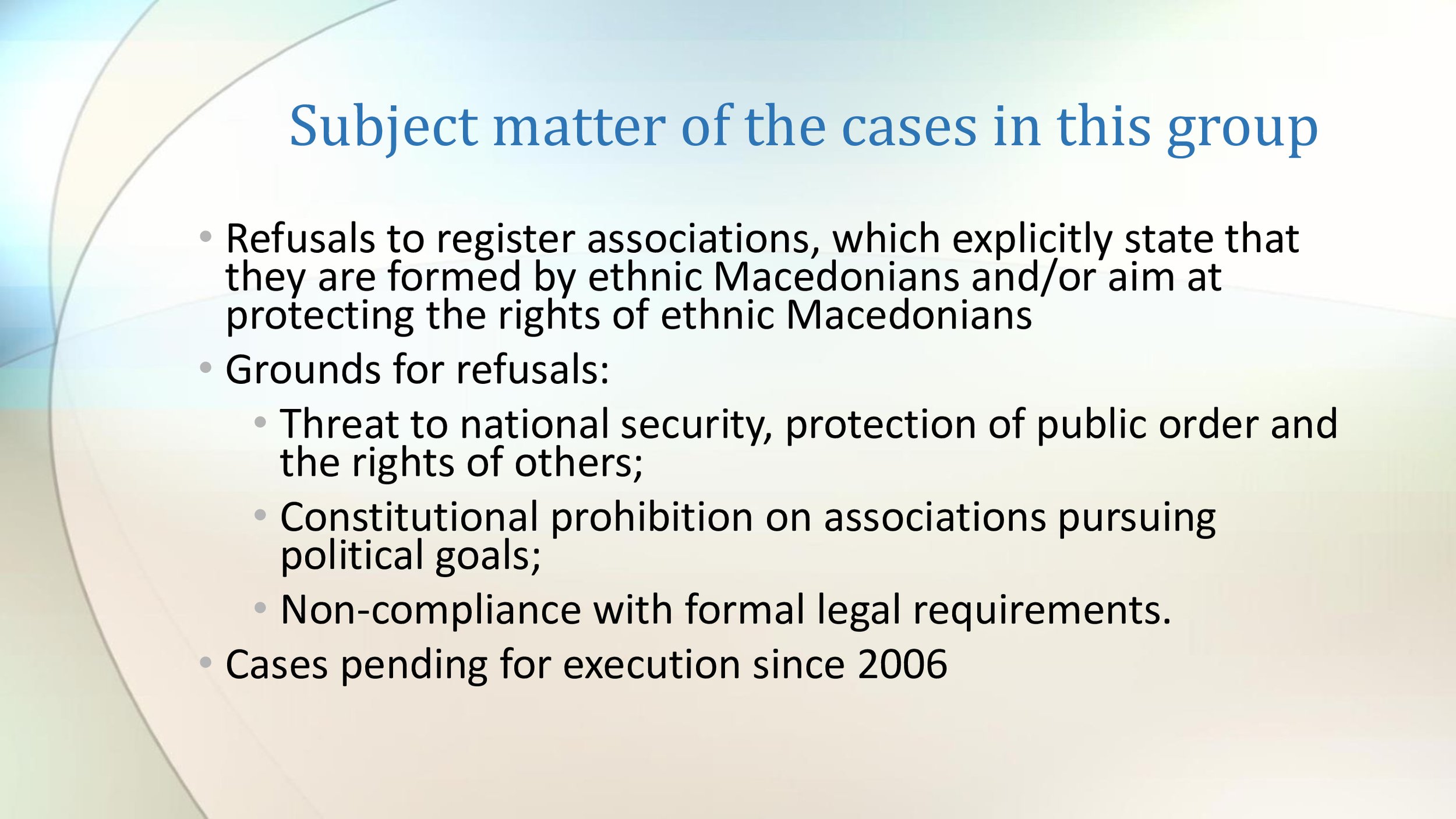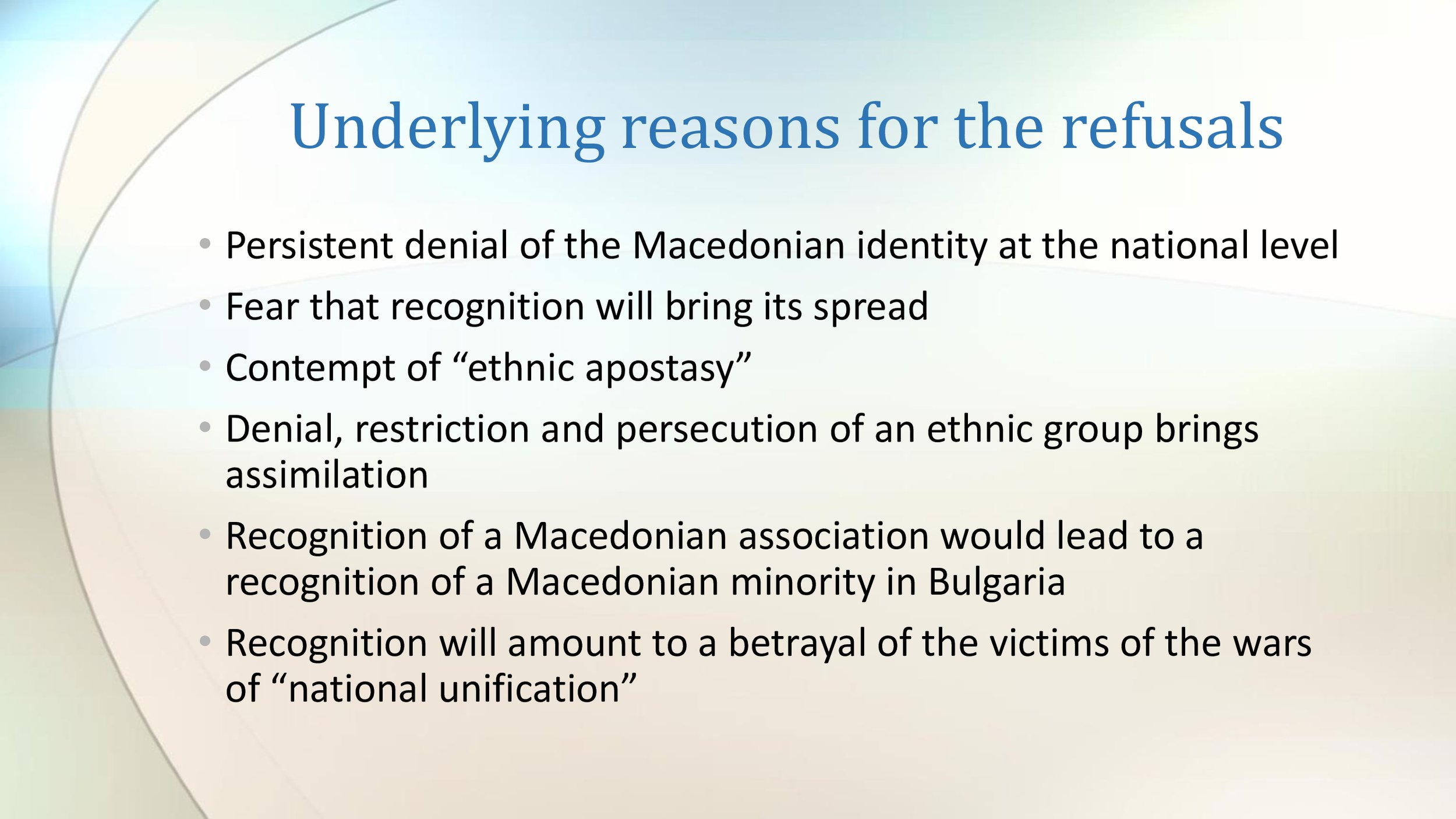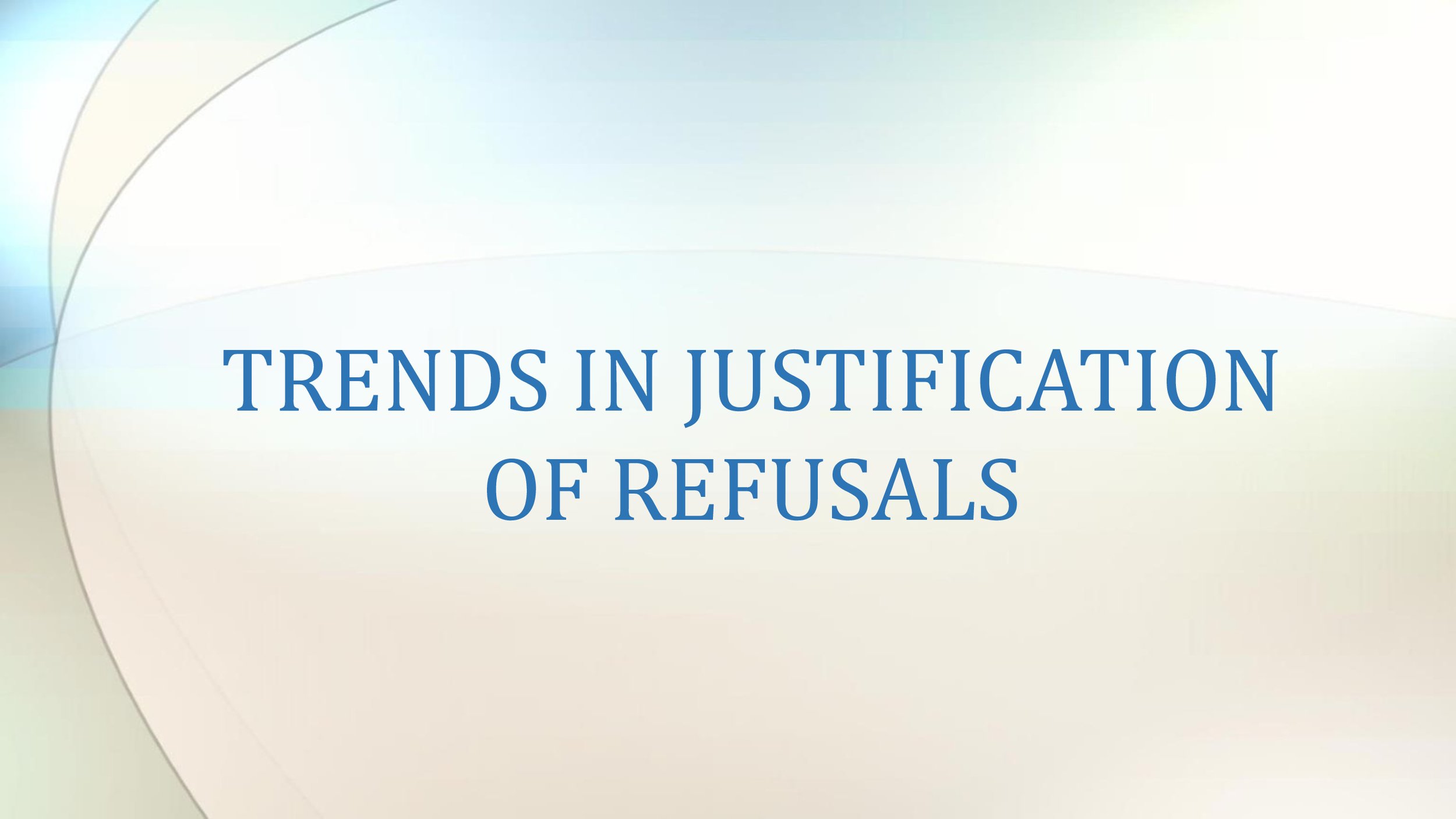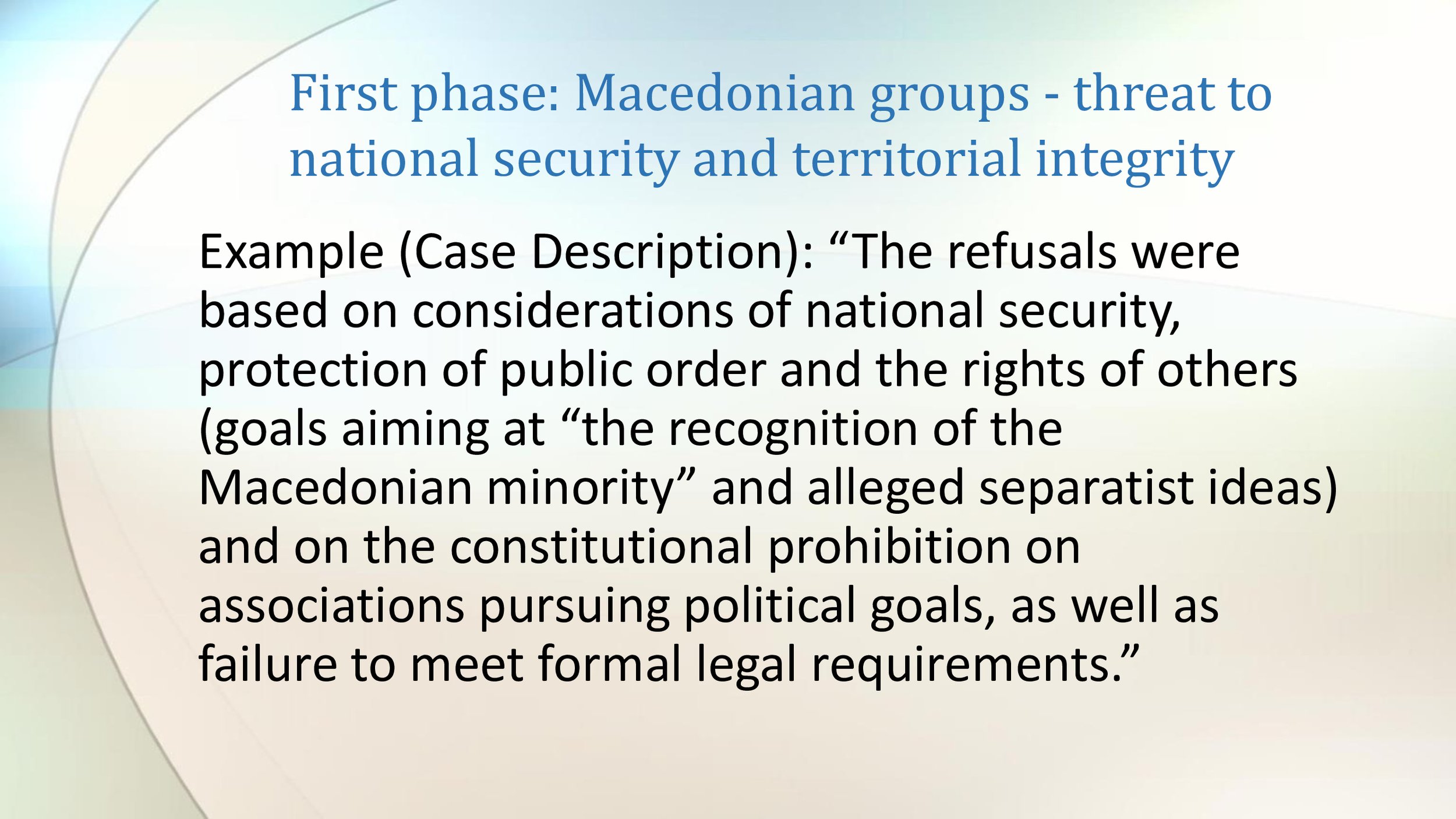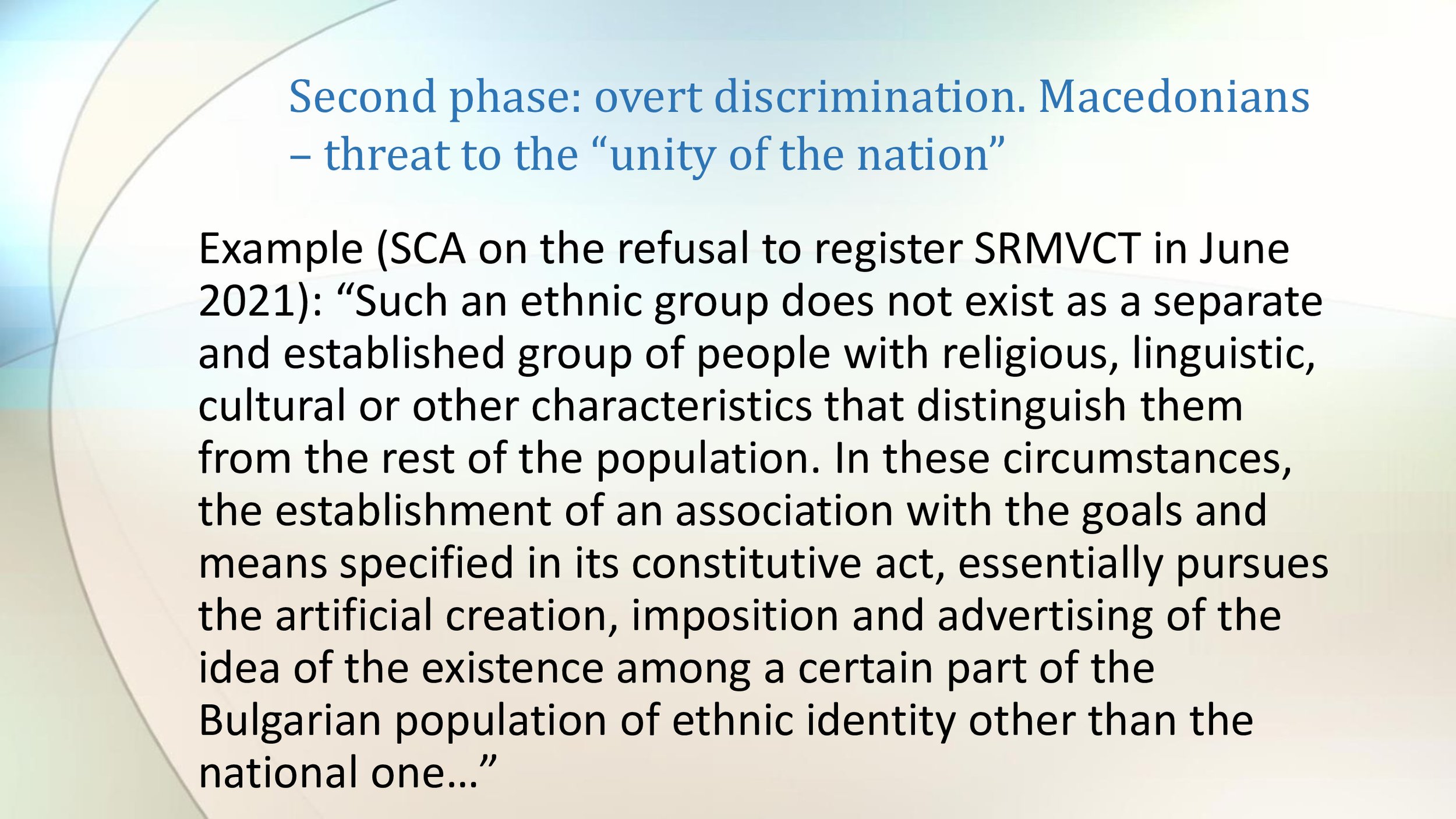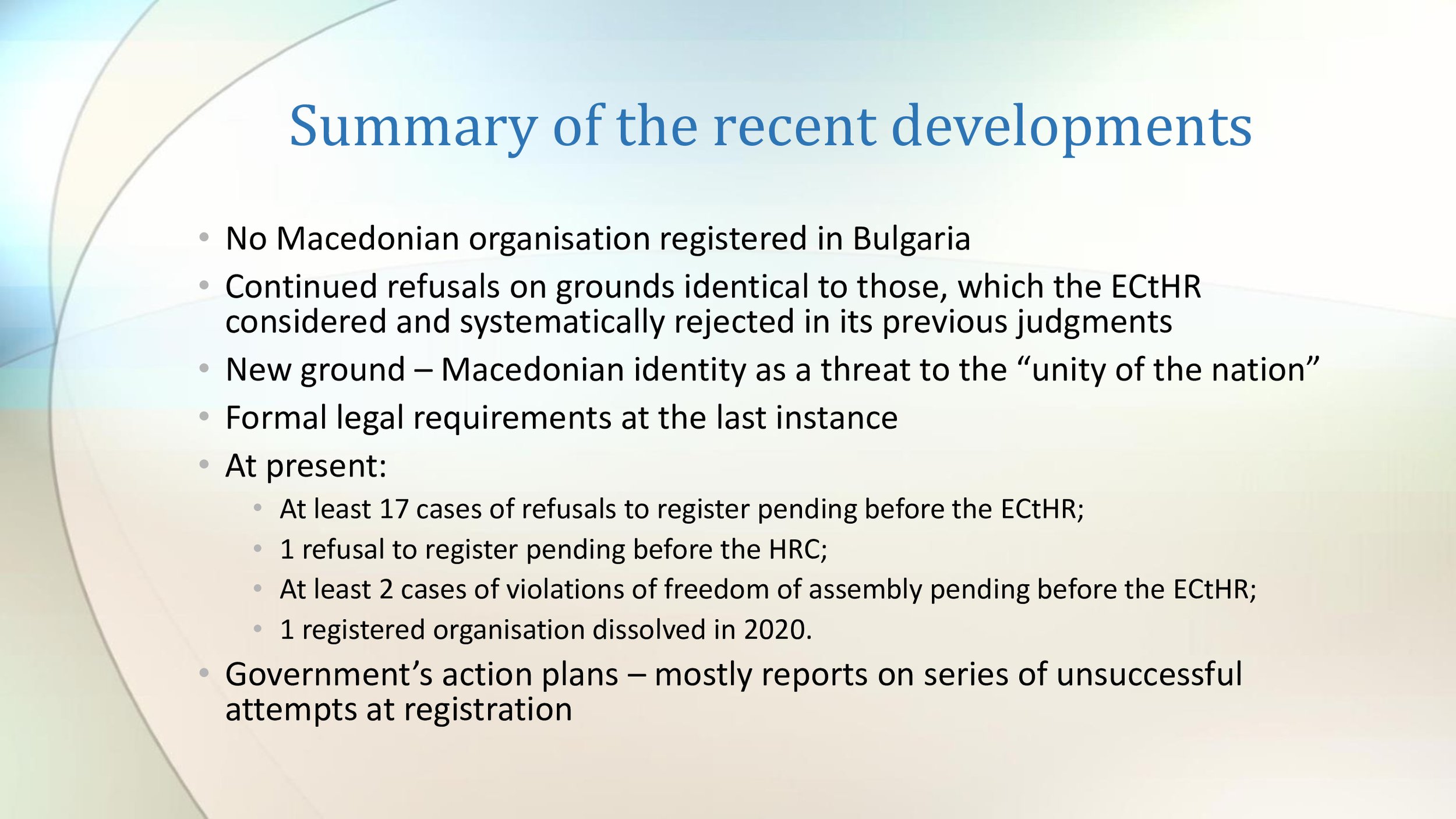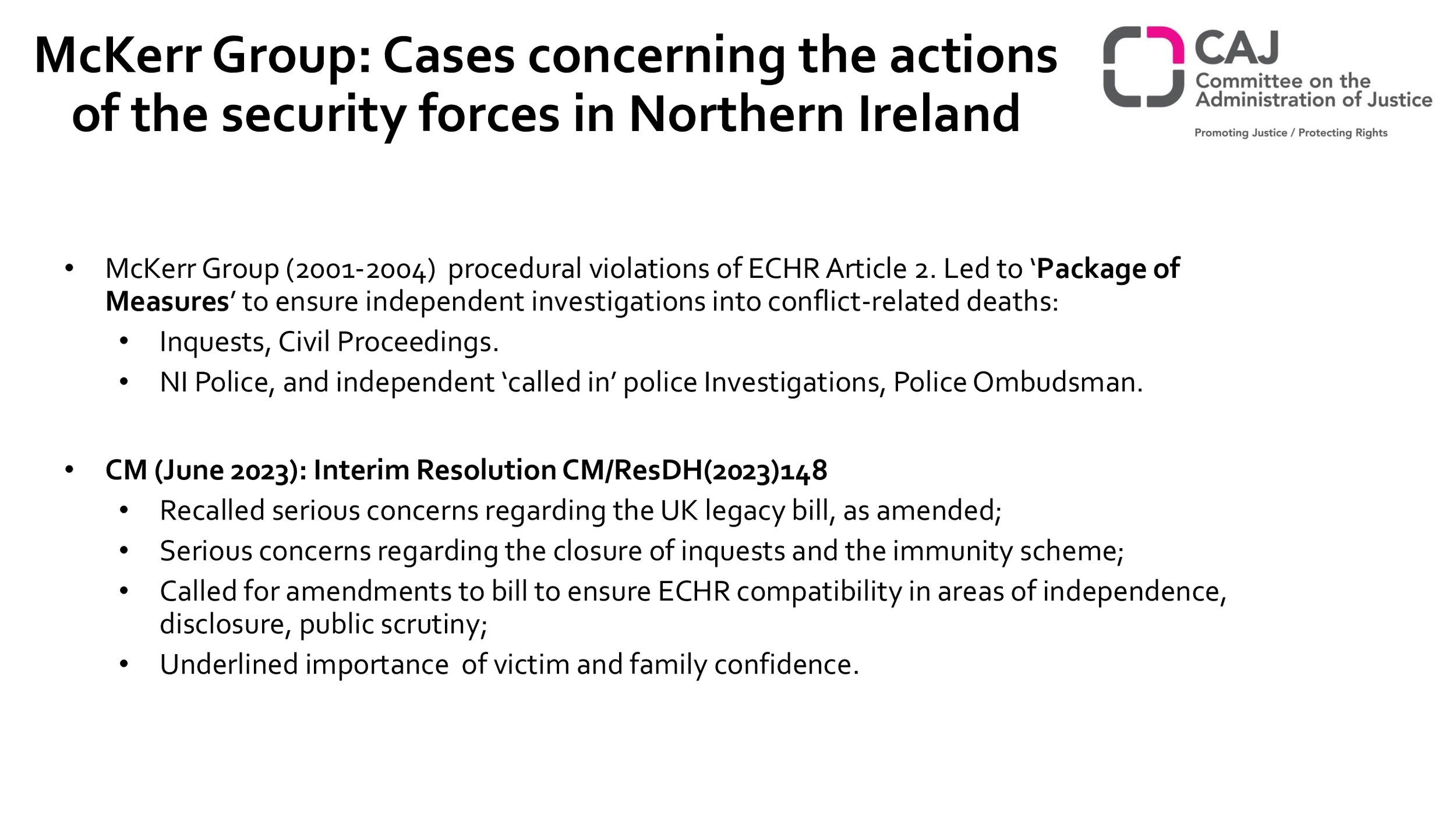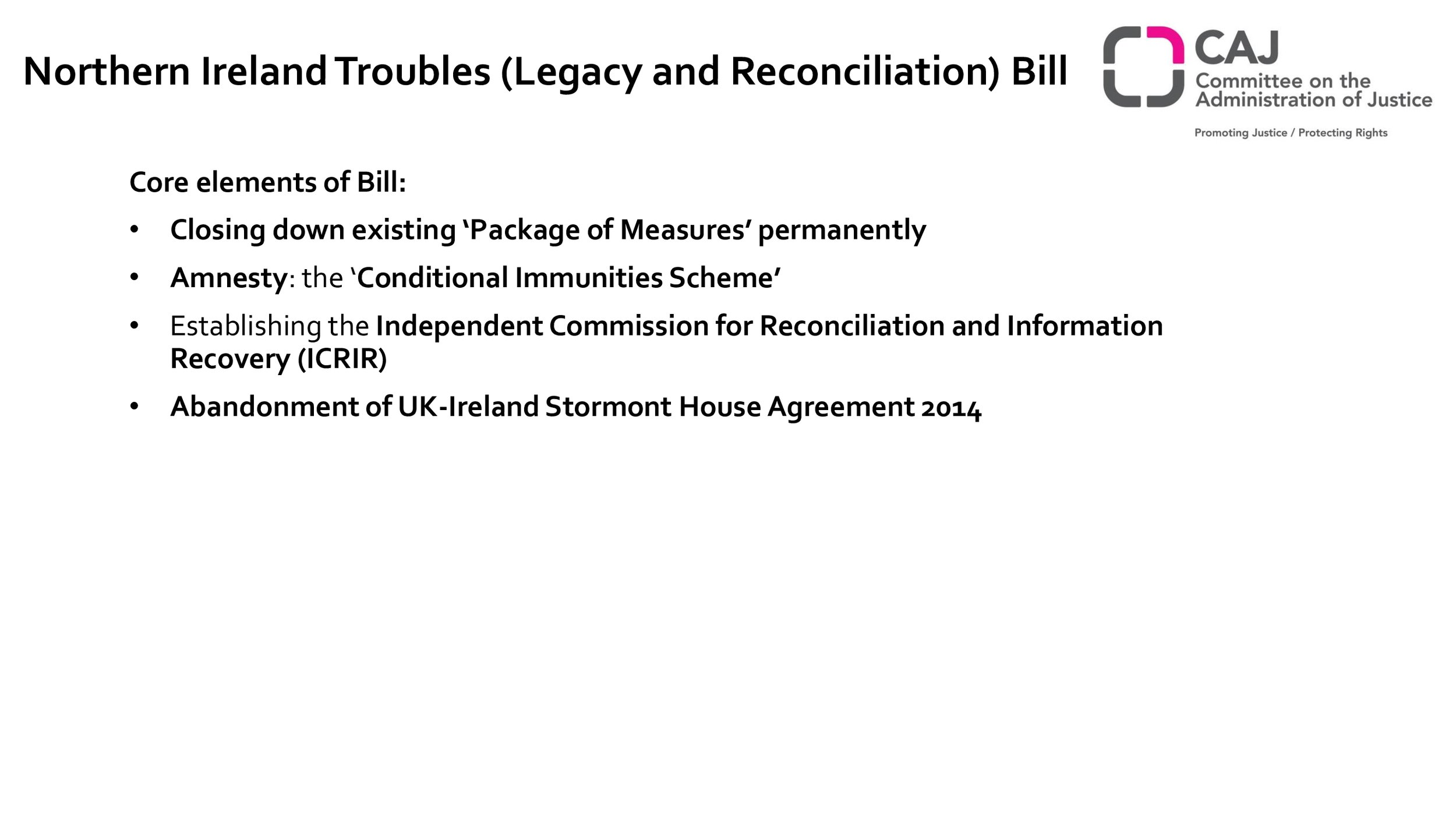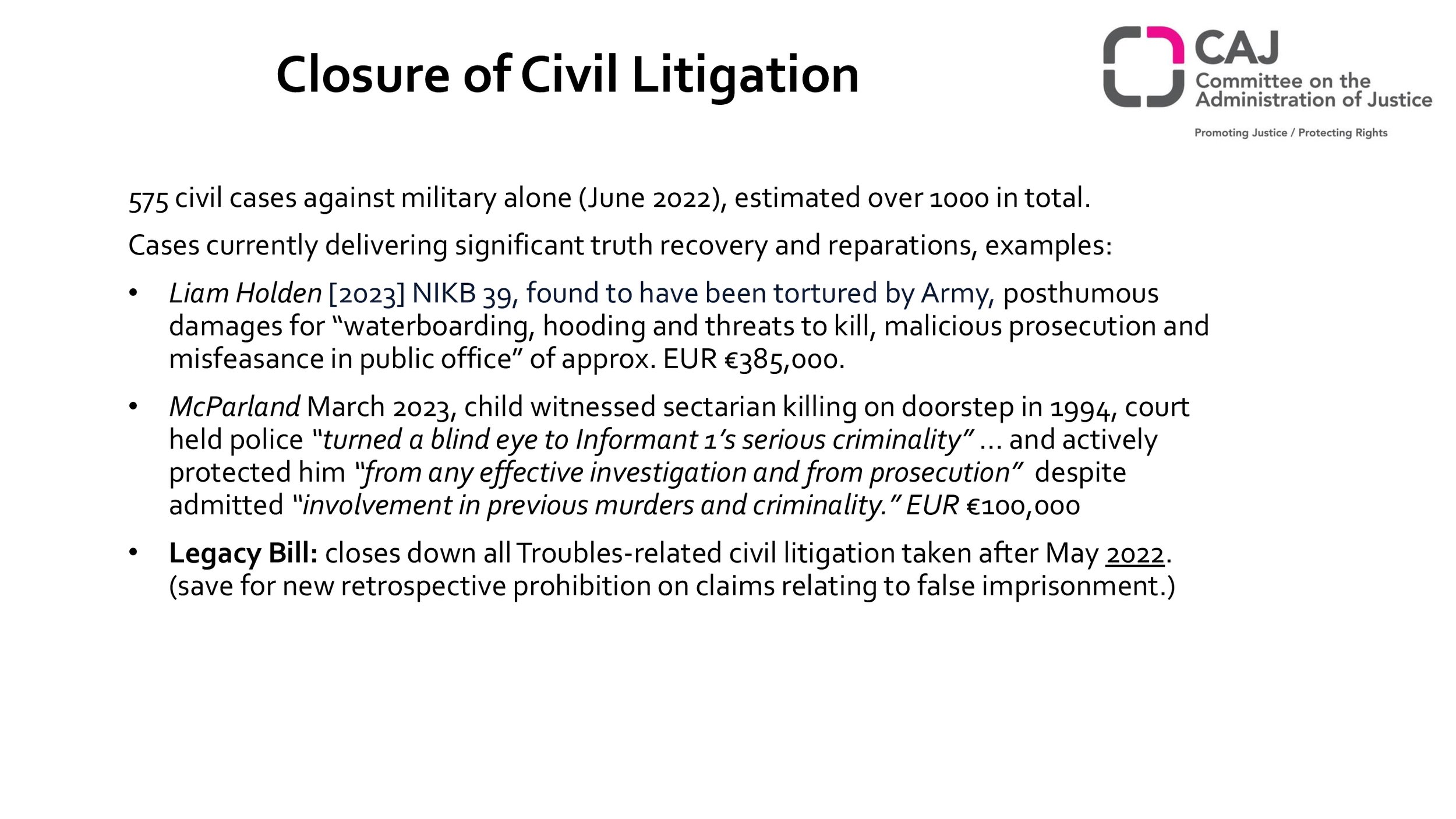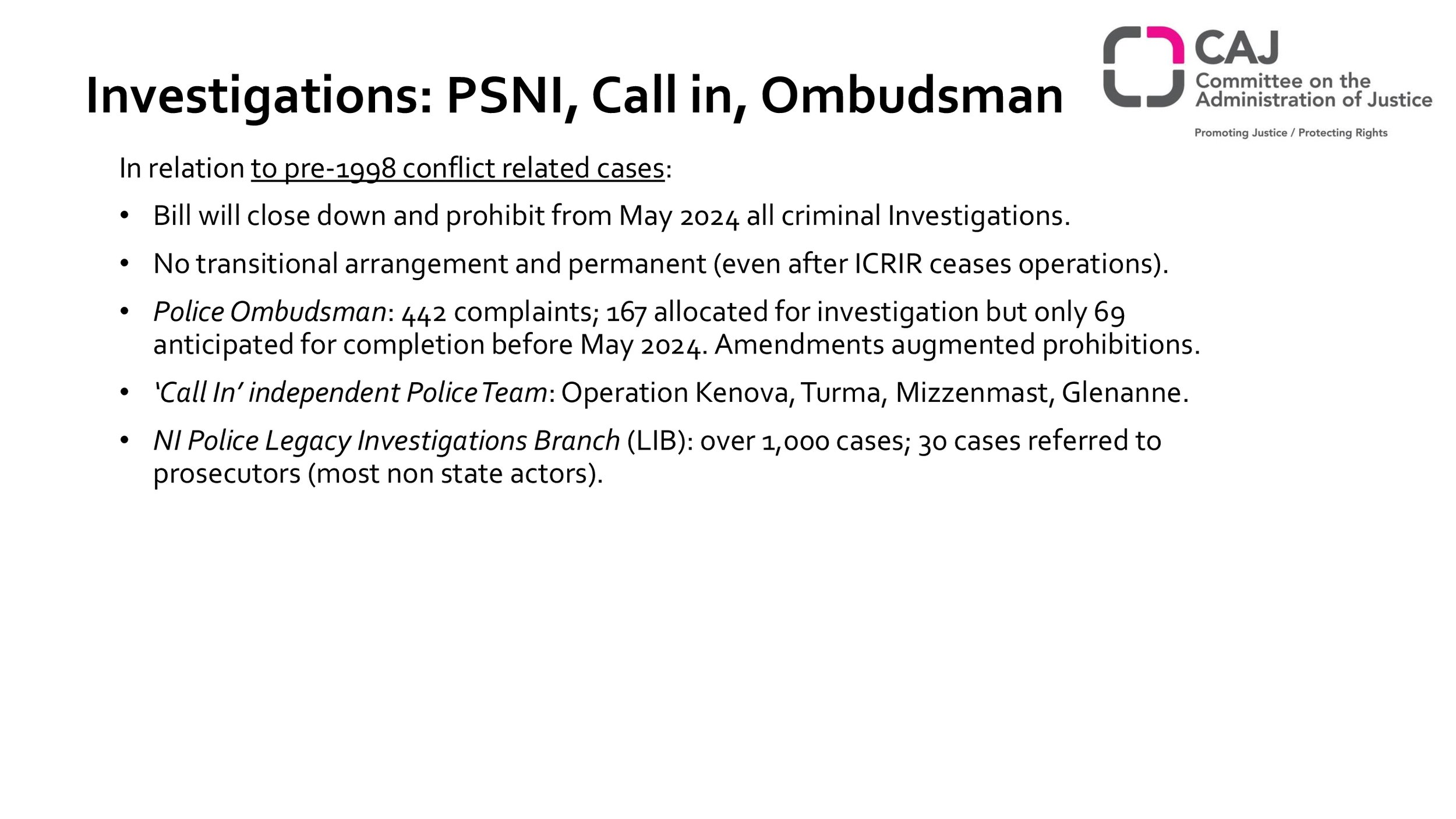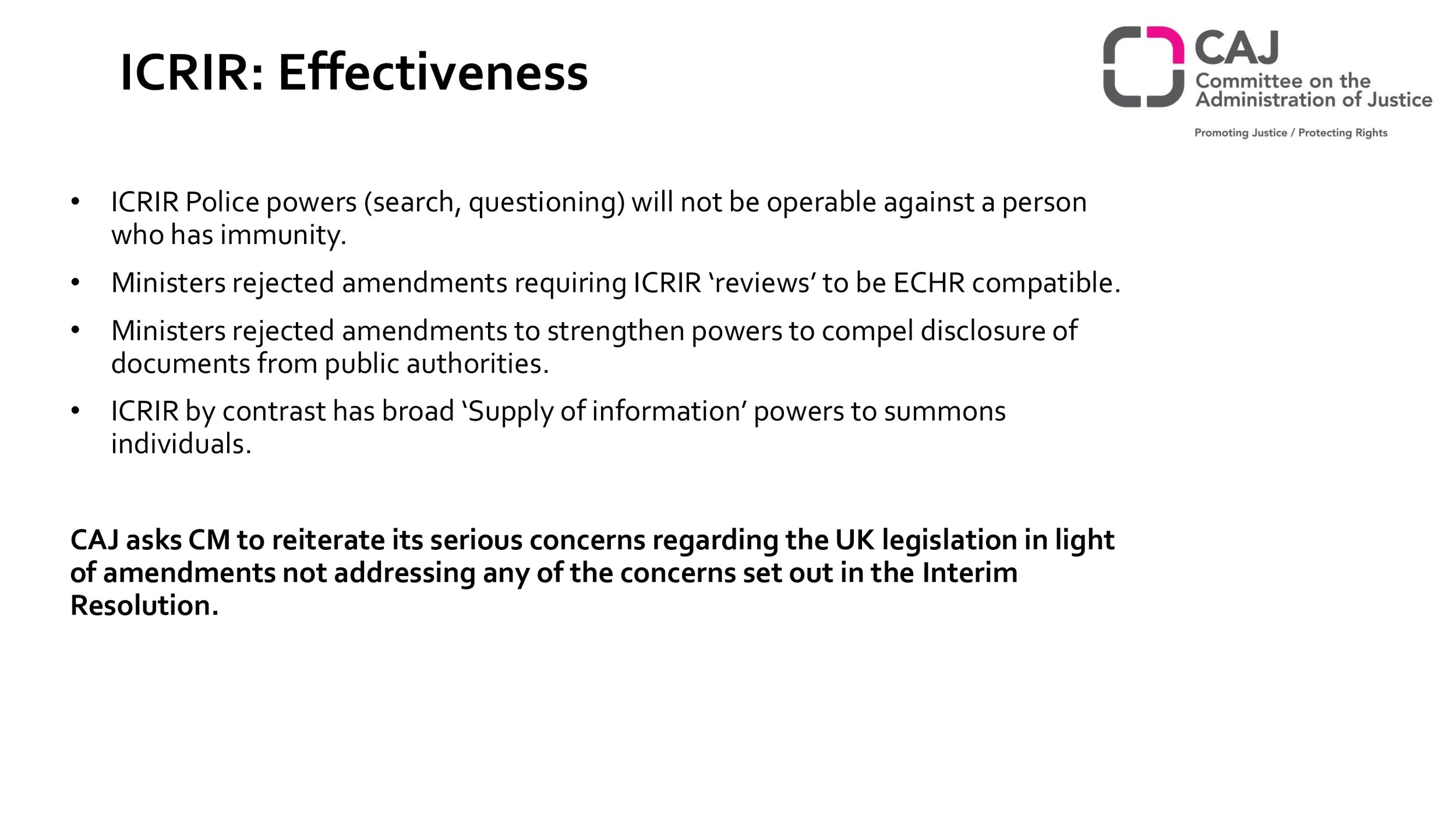EIN Civil Society Briefing September 2023: Hungary, Bulgaria, Greece & the UK
/On the 15th of September 2023, EIN held the latest civil society briefing for permanent Representations of the Council of Europe, ahead of the 1475th Committee of Ministers Human Rights Meeting on 19th – 21st September 2023. The event was held in person in Strasbourg, facilitated by Ioulietta Bisiouli, EIN Director.
The Briefing focused on the following cases:
Ilias and Ahmed v. Hungary concerns authorities’ failure to assess the risks of ill-treatment before expelling the applicants, asylum-seekers, to a “safe third country,” presented by Balazs Gaal, Policy Officer at the Hungarian Helsinki Committee.
Safi and Others v. Greece concerns the lack of effective investigation into the sinking of a vessel that resulted in the death of some of the refugees on-board, presented by Mr Minos Mouzourakis, Legal & Advocacy Officer at Refugee Support Aegean and Mr Stephanos Stavros, Human Rights Lawyer.
Umo Ilinden and Others v. Bulgaria concerns unjustified refusals by the courts to register an association aiming at achieving “the recognition of the Macedonian minority in Bulgaria,” presented by Krassimir Kanev, the Chair of Bulgarian Helsinki Committee.
McKerr v. The United Kingdom concerning actions of security forces in Northern Ireland in the 1980s and 1990s, presented by Daniel Holder from Committee on the Administration of Justice.
The Ilias and Ahmed v. Hungary case concerns authorities’ failure to comply with their procedural obligation to assess the risks of ill-treatment before removing the two asylum-seeking applicants to Serbia in 2015. The Court found in particular that “there was an insufficient basis for the government’s decision to establish a general presumption concerning Serbia as a safe third country”, that “the expulsion decisions disregarded the authoritative findings of the UNHCR as to a real risk of denial of access to an effective asylum procedure in Serbia and summary removal from Serbia to North Macedonia and then to Greece, and that the authorities exacerbated the risks facing the applicants by inducing them to enter Serbia illegally instead of negotiating an orderly return.
Hungarian Helsinki Committee provided participants with the legislative developments and challenges:
Positive changes:
The “safe transit country” inadmissibility ground according to Section 51(2)(f) of the Asylum Act (found against EU law by the CJEU) was abolished as of 1 January 2023.
Remaining gaps:
There has been no reassessment of the legislative presumption of Serbia being a „safe third country” carried out by the Hungarian authorities.
Section XIV (4) of the Fundamental Law, which provided the constitutional foundation for the 'safe transit country' concept remains to be in force.
Sections 5 (1a) and (1b) of Act LXXXIX of 2007 on the State Border legalizing summary removals to Serbia remain to be in force.
Section 5 (1b) of Act LXXXIX of 2007 on the State Border extending the above legalization to the whole territory of the country under the state of crisis due to mass migration remains to be in force.
Hungarian Helsinki Committee continued to outline the embassy system and the summary removals to Serbia:
The Government’s communication, 26.6.2023:
„The legislative presumption of “safe third country” for Serbia has not been applied by the asylum authority and the national courts since the introduction of the transitional asylum procedure as of 26 May 2020 (“Embassy procedure”)”
C-823/21, Commission v. Hungary, 22.6.2023:
In the respective infringement procedure the CJEU ruled that:
By making the possibility, for certain third-country nationals or stateless persons present in its territory or at its borders of making an application for international protection subject to the prior submission of a declaration of intent at a Hungarian embassy situated in a third country and to the grant of a travel document enabling them to enter Hungarian territory, Hungary has failed to fulfil its obligations under the Asylum procedures directive.
Summary removals to Serbia
Legislation:
Section 5(1)(b) of the Act LXXXIX of 2007 on State Borders that regularized collective expulsions to Serbia remain to be in force.
Refusal to implement judgments:
R.N. v. Hungary 4.4.2023.
H.K. v. Hungary, 22.9.2022.
Shazad v. Hungary, 8.10.2021.
C-808/18, Commission v. Hungary,17.12.2020.
Hungarian Helsinki Committee highlighted the impacts of the war against Ukraine on the case:
Late January 2023, the practice at the Hungarian/Ukrainian border has changed. According to the new rules only those are granted entry:
who have the necessary and valid travel documents (e.g. visa, passport);
who are not under the effect of an entry ban;
•those third-country nationals who did not enter Ukraine after 24 February 2022.
As a result, third-country nationals (non Ukrainians) who have returned to Ukraine after the war are refused entry to Hungary. The non-refoulement examination bares serious shortcomings.
Hungarian Helsinki Committee provided their recommendations to the Committee of Ministers:
The HHC respectfully recommends the CM to continue examining the execution of the judgment.
Recommendations to the Government of Hungary:
Conduct a new adequate assessment of all existing sources on the situation of asylum seekers in Serbia.
Amend Section 51(2)(e) and Section 51/A of the Asylum Act to ensure that the “safe third country” concept is applied and expulsion is ordered only if the third country takes back the asylum seeker in an orderly manner.
Repeal the legislation legalizing summary removals and until it is done refrain from the unlawful practice on continuing these removals.
Take measures to ensure effective access to territory and procedure for those seeking protection at the borders and on the territory of Hungary.
Refrain from unlawful refusals at the Hungarian-Ukrainian border.
Please see the slides for the full Briefing.
Relevant Documents:
NGO Communications
CM Decisions
The Safi and Others v. Greece case concerns the ineffective investigation into a coastguard operation in 2014 in the Aegean Sea during which eleven relatives of the migrant applicants who were aboard a fishing boat drowned. The major shortcomings identified by the Court are the following: lack of investigation into the allegedly flawed translations of applicants’ statements which constituted an integral part of the case file; insufficient participation of the applicants in the criminal proceedings, who were not granted access to the recordings between the coastguards and to data from an island radar which were of significant evidentiary value; there were lines of further investigation which were clearly necessary but which were not pursued by the prosecuting authorities thus compromising their ability to shed full light on the circumstances of the sinking.
Mr Minos Mouzourakis from Refugee Support Aegean and Mr Stephanos Stavros, Human Rights Lawyer, outlined the key elements and context of the case:
Boat with 27 persons towed by Hellenic Coast Guard sank off Farmakonisi on 20 January 2014. 11 people drowned
Archived criminal proceedings against Coast Guard officials in the incident, as well as military officers subjecting applicants to degrading treatment upon arrival
Court awarded non-pecuniary damage
Violations found by the Court
Substantive violation of Article 2: delayed notification of JRCC, ill-equipped vessel without rescue equipment
Procedural violation of Article 2: deficiencies in interpretation and transcript of testimonies, denial of access to evidence, dismissal of submissions without due reasoning
Substantive violation of Article 3: degrading stripping and bodily search of survivors
Safi v. Greece in context – the Pylos shipwreck and beyond
Sinking of a trawler with an estimated 750 passengers in the Greek SAR zone on 14 June 2023. Only 104 survived.
CommDH called for effective investigation & highlighted that Pylos is “not an isolated incident” à explicit link of Pylos with Safi v. Greece
European Ombudsman opened own-initiative inquiry into Frontex role, including in the Pylos case
40 survivors lodged criminal complaint before the Piraeus Naval Court Prosecutor on 13 September 2023 – preliminary investigation pending
vBeyond Pylos: UN Special Procedures August 2023 concerns regarding failure to provide prompt & effective assistance to people in distress and call for investigation into Coast Guard alleged breaches of the right to life
Refugee Support Aegean and Mr Stephanos Stavros note the substantial and procedural obligations of the case to participants:
Substantive obligations under Article 2 ECHR: Coast Guard operations
Indicative cases
Farmakonisi 20 Jan 2014 - 11 dead - Safi v. Greece App No 5418/15 (Judgment)
Agathonisi 16 Mar 2018 - 16 dead - F.M. v. Greece App No 17622/21 (Communicated)
Pylos - 14 Jun 2023 - 600+ dead or missing - Pending domestic criminal proceedings
Key issues
Absence of interpretation services at the Coast Guard (JRCC, vessels) for effective communication
Delay in search and rescue
Absence of video-recording of Coast Guard rescue operations
Absence of adequate search and rescue equipment in deployed vessels
Conclusion: Safi v. Greece involves complex problems relating to the adequacy of resources, design and roll-out of Coast Guard operations at sea & on search and rescue
Procedural obligations under Article 2 ECHR: Effectiveness of investigations
(Coast Guard responsibility investigated by Piraeus Naval Court Prosecutor)
Indicative cases (others concerning sea and land)
Farmakonisi 20 Jan 2014 - Archived - Safi v. Greece App No 5418/15 (Judgment)
Pserimos 22 Sep 2014 - Archived - Alkhatib v. Greece App No 3566/16 (Communicated)
Symi 31 Aug 2015 - Acquitted before trial - Almukhlas v. Greece App No 22776/18 (Communicated)
Agathonisi 16 Mar 2018 - Complaint dismissed - F.M. v. Greece App No 17622/21 (Communicated)
Pylos 14 Jun 2023 - Pending preliminary examination
Key issues
Preliminary interrogation & initial evidence collection by Coast Guard officials
Piraeus Naval Court Prosecutor not promptly intervened
Limited number of witness testimonies
Deficiencies in interpretation
Deficiencies in inspections, use of available digital evidence etc.
Refugee Support Aegean and Mr Stephanos Stavros provide their conclusions & recommendations to the Committee of Ministers:
Conclusions
Violations occurred in January 2014 relevant through time: similar incidents e.g. in Agathonisi (2018), Pylos (2023)
Execution raises complex issues as regards the adequacy of resources, design and roll-out of Coast Guard operations at sea & on search and rescue
Assessment of investigations raises complex issues on institutional set-up (interrogation officials, prosecutors’ approach), adequacy of selection and modalities of witness examination, assessment of evidence et al.
Safi v. Greece should be transferred to enhanced supervision
Recommendations
The regulatory framework governing Coast Guard operations in the area of border protection and search and rescue should be updated in full compliance with international, EU and national law and in particular Regulation (EU) 656/2014 and the Asylum Procedures Directive (2013/32/EU). Such a revision would ensure correct and sufficient guidance on how to assess distress phases, to safeguard the life and integrity of third parties on board in the management of incidents concerning refugees at sea, and to guarantee access to the asylum procedure.
Greek authorities should ensure sufficient and adequate interpretation services to enable effective communication of interested parties with EKSED, 112 and involved Coast Guard vessels.
Coast Guard operations and vessel courses should be fully audio- and video- recorded, with a view to improving coordination, prevention of instances of ill-
treatment and effective investigation of complaints.
Greek authorities should immediately cease practices endangering human lives at sea e.g. unreasonable use of firearms, push backs and abandonment
of people on life-rafts.
The Prosecutor of the Naval Court of Piraeus should immediately intervene in cases involving the Coast Guard. Preliminary interrogations should not be
conducted by Coast Guard officers, in conformity with Circular 1/2023.
Testimonies should be collected from all passengers, otherwise a substantial number, with an adequate, certified and independent interpreter in a
language they understand.
Inspections, expert reports and forensic reports should be independent and reliable in line with international standards. Digital evidence, where available, should be used in the criminal investigation of incidents.
Survivors of shipwrecks should immediately be referred to adequate living conditions and support services, and should not be detained. The authorities
should immediately register missing persons, collect DNA samples and issue certificate of missing persons to their relatives.
Please see the slides for the full Briefing.
Relevant Documents
NGO Communications
Umo Ilinden and Others v. Bulgaria
The Umo Ilinden and Others v. Bulgaria case concerns the unjustified refusals of the courts, between 1999 and 2015, to register associations the aim of which is to achieve the recognition of and protect the interests of "the Macedonian minority in Bulgaria”. The refusals were based on considerations of national security, protection of public order and the rights of others (goals aiming at “the recognition of the Macedonian minority” and alleged separatist ideas) and on the constitutional prohibition on associations pursuing political goals, as well as failure to meet formal legal requirements.
Mr Krassimir Kanev from the Bulgarian Helsinki Committee outlines to participants the underlying reasons for the refusals:
Persistent denial of the Macedonian identity at the national level
Fear that recognition will bring its spread
Contempt of “ethnic apostasy”
Denial, restriction and persecution of an ethnic group brings assimilation
Recognition of a Macedonian association would lead to a recognition of a Macedonian minority in Bulgaria
Recognition will amount to a betrayal of the victims of the wars of “national unification”
Bulgarian Helsinki Committee provide participants with developments with the Macedonian groups’ dynamics:
Proliferation of the Macedonian groups
Renouncing radicalism of demands
Persistent attempts to obtain recognition and to register associations
Attempts to use all available or imagined opportunities
Activism more pronounced among the senior age groups
Bulgarian Helsinki Committee highlight to participants the trends in justifications of refusals:
First phase: Macedonian groups - threat to national security and territorial integrity
Example (Case Description): “The refusals were based on considerations of national security, protection of public order and the rights of others (goals aiming at “the recognition of the Macedonian minority” and alleged separatist ideas) and on the constitutional prohibition on associations pursuing political goals, as well as failure to meet formal legal requirements.”
Second phase: overt discrimination. Macedonians – threat to the “unity of the nation”
Example (SCA on the refusal to register SRMVCT in June 2021): “Such an ethnic group does not exist as a separate and established group of people with religious, linguistic, cultural or other characteristics that distinguish them from the rest of the population. In these circumstances, the establishment of an association with the goals and means specified in its constitutive act, essentially pursues the artificial creation, imposition and advertising of the idea of the existence among a certain part of the Bulgarian population of ethnic identity other than the national one…”
Third phase: mixed reasons
RA and the regional courts – overt discriminatory reasons based on the goals and the Macedonian identity of the members
SCA – disregards entirely the reasons of the lower court and justifies refusals by non-compliance with formal legal requirements. E.g.:
Improper regulation of representation;
Lack of regulation of property relations upon termination of membership;
Lack of regulation of for-profit activities.
Bulgarian Helsinki Committee note recent developments and their conclusions to participants:
No Macedonian organisation registered in Bulgaria
Continued refusals on grounds identical to those, which the ECtHR considered and systematically rejected in its previous judgments
New ground – Macedonian identity as a threat to the “unity of the nation”
Formal legal requirements at the last instance
At present:
At least 17 cases of refusals to register pending before the ECtHR;
1 refusal to register pending before the HRC;
At least 2 cases of violations of freedom of assembly pending before the ECtHR;
1 registered organisation dissolved in 2020.
Government’s action plans – mostly reports on series of unsuccessful attempts at registration
Please see the slides for the full Briefing.
Relevant Documents:
NGO Communications
CM Decisions
McKerr Group v. the United Kingdom
The McKerr Group v. the United Kingdom case concerns investigations into the deaths of the applicants’ next-of-kin in Northern Ireland in the 1980s and 1990s, either during security force operations or in circumstances giving rise to suspicion of collusion in their deaths by security force personnel.
Committee on the Administration of Justice provided an overview of the case to participants:
CAJ is principal human rights NGO in Northern Ireland and affiliated to EIN and FIDH.
1998 Good Friday Agreement guarantees incorporation of ECHR into Northern Ireland law with remedies for victims and direct access to courts.
2014 Stormont House Agreement provided for new transitional justice mechanisms.
McKerr Group: ‘Package of Measures’ & peace process reforms:
Inquests, Civil Proceedings.
Police Investigations, independent ‘called in’, police ombudsman investigations
Learning also from Package of Measures as to safeguards needed in transitional justice mechanisms to ensure effective and independent investigations in Northern Ireland.
Committee on the Administration outlined to participants the Northern Ireland Troubles (Legacy and Reconciliation) Bill:
Core elements of Bill:
Closing down existing ‘Package of Measures’ permanently
Amnesty: the ‘Conditional Immunities Scheme’
Establishing the Independent Commission for Reconciliation and Information Recovery (ICRIR)
Abandonment of UK-Ireland Stormont House Agreement 2014
Ministerial amendments to Bill published evening after June Committee of Ministers meeting - Commissioner Mijatović amendments leave “the fundamental problems with the Bill intact.”
UK Ministers: Objectives of the Bill:
Secretary of State for Northern Ireland Brandon Lewis MP:
•In introducing Bill stated purpose was to end investigations into veterans, who would no longer have to fear ‘a knock at the door’ (UK Parliament, 24 May 22, vol 715, Col 115)
•Stated that due to the Bill “no longer will our [military] veterans be hounded and hauled in for questioning about events that happened decades ago.” (Conservative Home, 9 June 2022)
Military Veterans Minister: Johnny Mercer MP spoke of ‘vexatious’ investigations, prosecutions’ (UK Parliament debate on Bill, June 2023).
•Ministers have implied lawyers, human rights groups, judges, prosecutors, independent institutions and officers have created a ‘pernicious counter narrative’ and are ‘rewriting history’.
•By contrast UNSR Pablo DeGrieff UN Doc: A/HRC/34/62/Add (2016) found Northern Ireland impunity gap was in ‘apparent selectivity’ in prosecutions during the conflict.
•CAJ-academic study found key arguments deployed that legacy cases are ‘imbalanced’ against the security forces “are neither factually nor legally accurate and lack intellectual credibility.”
Committee on the Administration shared developments on the closure of Civil Litigation and Legacy Inquests:
Closure of Civil Litigation
575 civil cases against military alone (June 2022), estimated over 1000 in total.
Cases currently delivering significant truth recovery and reparations, examples:
Liam Holden [2023] NIKB 39, found to have been tortured by Army, posthumous damages for “waterboarding, hooding and threats to kill, malicious prosecution and misfeasance in public office” of approx. EUR €385,000.
McParland March 2023, child witnessed sectarian killing on doorstep in 1994, court held police “turned a blind eye to Informant 1’s serious criminality” … and actively protected him “from any effective investigation and from prosecution” despite admitted “involvement in previous murders and criminality.” EUR €100,000
Legacy Bill: closes down all Troubles-related civil litigation taken after May 2022.
Amendments to Bill to prohibit all claims relating to Interim Custody Orders (internment, regardless of when proceedings taken).
Closure of Legacy Inquests
Lord Chief Justice’s Five Year Plan of legacy inquests – 18 competed , 36 outstanding (16 at hearing)
Plus 10 new inquests also directed by Attorney General (state and non state actors).
Stormont House Agreement would have left inquest system intact.
Original bill closed inquests save those substantively commenced by May 2023.
Ministers amended Bill in Lords to close down more inquests, only those that have completed proceedings by May 2024 can proceed.
Ministers’ complained coronial judges progressing inquests too ‘expeditiously’.
Legacy Inquests:
Northern Ireland’s ‘truth trials’
UK Command Paper preceding bill claims “the vast majority” of killings by the security forces were lawful.
Majority of Inquests concerning State cases contradicting official truth:
Stephen Geddis (aged 10), shot dead by British soldier on 30 August 1975, Coroner held (verdict 06.09.22) that the victim posed no threat, and the firing was not justified.
Thomas Mills, shot dead by British soldier in July 1972, Coroner held (verdict 13.05.22) that the soldier was not justified in opening fire and the force used was disproportionate to the threat perceived.
Pat McElhone, shot dead by British soldier on 7th August 1974, Coroner held (verdict 21.01.21) that the shooting cannot be justified.
Ballymurphy massacre, ten civilians shot dead by the British army in August 1971 (Francis Quinn, Fr Hugh Mullan, Noel Phillips, Joan Connolly, Daniel Teggart, Joseph Murphy, Edward Doherty, John Laverty, Joseph Corr, and John James McKerr.) Corner held (verdict 11.05.21) that the killings were unjustified.
Kathleen Thompson, shot dead by British solider on 6th November 1971. Coroner held (29.06.22) that the shooting was ‘unjustified.’
Leo Norney (17) shot dead by British soldier on 13 September 1975. Corner held (verdict 03.07.23) that Leo was ‘entirely innocent’ and that he had been deliberately killed by Paratrooper McKay.
Committee on the Administration provided insights into investigations & conditional immunities scheme:
PSNI, Call in, Ombudsman Investigations:
In relation to pre-1998 conflict related cases:
Bill will close down and prohibit from May 2024 all criminal Investigations by police, ‘call in’ and Police Ombudsman. Exemption permitting investigative reports to be produced after cut-off date, removed from the Bill by Ministerial amendment.
No transitional arrangement, unlike SHA.
Prohibition on investigations permanent – even after ICRIR ceases operations.
Police Ombudsman: 442 complaints; 167 allocated for investigation but only 69 anticipated for completion before May 2024. Amendments augmented prohibitions on Ombudsman investigating conflict-related human rights violations.
‘Call In’ independent Police Team: Operation Kenova, Turma, Mizzenmast, Glenanne.
NI Police Legacy Investigations Branch (LIB): over 1,000 cases; 30 cases referred to prosecutors (most (Irish) republican and (British) loyalist armed groups).
Conditional Immunities Scheme
Voted out by upper chamber of UK Parliament (House of Lords) but reinstated by lower chamber, House of Commons.
Government Amendments leave low subjective threshold of immunity intact.
The ICRIR must grant immunity to applicants who give information they themselves believe to be true. Applicants do not have to give any new information at all – former soldiers could rely on original statements with no legal standing.
No exemption for torture. Opposition introduced exemption for immunity for sexual offences, but investigations still prohibited.
Revoking immunity on basis of a fresh terrorist conviction added: but police will still be statute barred from investigating original offence, even after ICRIR ceases.
Ministerial amendments expressly incentivise applications for immunity by abolishing the ‘Early Release Scheme’ under Good Friday Agreement.
Committee on the Administration provided feed back on the ICRIR’s independence and effectiveness:
ICRIR Independence:
Committee of Ministers concerns regarding role of Secretary of State (SoS) in ‘establishment and oversight of ICRIR’.
Appointments: SoS appoints all Commissioners. Amendment that SoS to ‘consult’ re appointing Chief Commissioner- but recruitment has already happened.
Budget and Oversight: SoS controls budget and provides all oversight of ICRIR.
Mandate: Sops can limit Commissioners’ terms and close ICRIR at any time.
Caseload: SoS extensive powers to shape caseload of ICRIR.
National Security + Veto: SoS can redact ICRIR reports to families.
Composition of investigators: departs from Ombudsman & Call-in practice.
ICRIR: Effectiveness
‘Reviews’ can include criminal investigations with police powers but such powers of (search, questioning) will not be operable against a person who has immunity.
Ministers rejected amendments requiring ICRIR ‘reviews’ to be ECHR compatible.
Ministers rejected amendments to strengthen powers to compel disclosure of documents from public authorities.
ICRIR by contrast has broad ‘Supply of information’ powers to summons individuals subject to a £5,000 fine or even imprisonment for refusing to hand over a document, with no express safeguards (e.g. journalistic sources, legal privilege).
ICRIR has no control over its own caseload or final content of its reports.
Please see the slides for the full Briefing.
Relevant Documents
NGO Communications
NHRI Communications
CM Decisions

